Notifications
What does ‘my condolences’ mean.
You may have heard the phrase “my condolences” passed around whenever someone dies, but what exactly does it mean? This article covers the various ways you can send your condolences when someone passes away and what exactly “my condolences” means. If you’ve said “you have my deep condolences'” and don’t know its meaning, this article is a great place to start.

What does "my condolences" mean?
The phrase "my condolences" is an expression of sympathy and sorrow, typically offered to someone who has experienced a loss or is going through a difficult time, such as the death of a loved one. When you say "my condolences," you are expressing your heartfelt sympathy and offering comfort to the person who is grieving. It is a way to convey your understanding of their pain and to let them know that you share in their sorrow. The phrase is commonly used in situations of bereavement or other challenging circumstances to express empathy and support. Here are some simplified versions of “my condolences” and their meanings:
- “My condolences to you and your family” meaning > “My deepest sympathies to your family” or “I am sharing in this grief with you and your family”
- “My deepest condolences” meaning > “I am sharing in this grief with you, deeply”
- “Sending my condolences” meaning > “I want to send you my thoughts and let you know I am sharing in this grief with you”
Essentially, any time you say “my condolences”, you’re just letting the recipient know that you are sharing in their grief and that your sympathies are with them.
Is it my deepest condolence or condolences?
The correct phrase is "my deepest condolences." The word "condolences" is commonly used in its plural form when expressing sympathy for someone who has experienced a loss or hardship.
How do I send my condolences?
Expressing condolences is a delicate matter that requires sensitivity and consideration for the grieving individual. In person, offering your sympathies is appropriate for anyone you know that’s lost someone, allowing you to provide immediate emotional support. Use a compassionate tone, such as, "I'm deeply sorry for your loss, and I'm here for you in any way you need." If distance prevents an in-person meeting, a phone call is a personal alternative, especially for those with whom you share a close relationship. Speaking directly allows you to convey sincerity and offers the opportunity for a more nuanced conversation. For less intimate connections or when immediate contact isn't feasible, email can be a suitable choice . Craft a thoughtful message expressing condolences and a willingness to assist if needed. A handwritten or typed letter, while more formal, is appropriate when you want to convey a deeper sentiment or share specific memories. Lastly, for brief and casual relationships, a text message can serve as a quick yet considerate way to express condolences. Regardless of the method chosen, the key is to convey genuine sympathy and a willingness to provide support during a difficult time.
Different ways to express your condolences
Saying “My condolences” is just one of many ways you can express your condolences towards someone who is grieving. The following are alternatives to the simple “my condolences” phrase and are useful when sending your sympathies to someone who has recently experienced a loss.
- I'm so sorry for your loss.
- Please accept my deepest condolences for your loss.
- My heart goes out to you during this difficult time.
- You're in my thoughts and prayers.
- Sending you my deepest condolences on your loss.
- I extend my sincere condolences to you and your family.
- Wishing you strength and peace in the midst of sorrow.
- May the memories of your loved one bring you comfort.
- Sending you love and light during this challenging time.
- Please extend my condolences to [the/your] family.
- I share in your grief and am here for you.
- My heartfelt condolences on the passing of your [relationship].
- I can't imagine the pain you're going through; my thoughts are with you.
- In this time of sadness, may you find moments of peace.
- Please know that you're not alone; I'm here to support you.
- May the love around you provide strength and solace.
- I am here to support you and I am sending you my sincerest condolences.
- Offering my sympathy and support as you navigate this difficult journey.
- My deepest condolences on your profound loss.
- Please accept my most sincere condolences on your loss.
- I'm here to lend an ear or a shoulder to lean on whenever you need.
- Wishing you comfort, courage, and strength in the days ahead.
- Your loss is felt deeply, and I'm here to offer any assistance you may need.
- Extending my warmest condolences and keeping you in my thoughts.
- Please accept my condolences to you and your family, you are in our thoughts.
- From the bottom of my heart, please accept my deepest condolences to you and your family.
Feel free to choose the expression that resonates most with the specific situation and your relationship with the bereaved person.
Understanding how to express your condolences is helpful in navigating these sensitive situations after someone dies. Whether conveyed in person, over the phone, through email, a letter, or a text message, the key lies in genuine sincerity and a willingness to provide support.
If you have lost a loved one and are looking for other ways to express your condolences, consider sending a beautiful bouquet through Ever Loved . Flowers and sympathy gifts are a wonderful way to let someone know that they’re in your thoughts.
Send flowers
Create a memorial website
Get funeral quotes, get free grief support, a complete guide to biodegradable urns.
When faced with the task of choosing an urn, you have a ton of options. In this simple and comprehensive guide, the world of biodegradable urns is explored—an eco-friendly option that offers a gentle way to honor your loved ones. What is a biodegradable urn? A biodegradable urn is a specia
How Long Does an Executor Have to Pay the Beneficiaries After a Death?
Executors of wills have responsibilities to the beneficiaries of those wills, and knowing what their responsibilities are can help you avoid being taken advantage of when the time comes. Whether it’s ex
What is Next of Kin and What are their Rights and Responsibilities?
“Next of kin” is a phrase that you’ve likely heard, especially when it comes to inheritance and legal matters – but what exactly is next of kin? This article covers next of kin’s meaning, explores who is legally classed as next of kin, and what that means after someone dies. What does next of
Create a space to remember someone

Advertisement
How to write a condolence message: 60+ examples & tips.

We've all been there. Someone's friend or family member passes away, and we want to be supportive and show understanding. But we don't know exactly what to say or what to do, and we're left feeling awkward and a bit stuck.
It can be challenging to know just what to say to someone who has lost a loved one, but most people who have experienced a death appreciate hearing from friends and loved ones. We spoke with grief experts whose advice can help us find the right words to write heartfelt sympathy notes and condolence messages.
Writing a condolence message.
A condolence message can take many forms but is understood to be an expression of sympathy when someone dies. Letting a person who has just experienced a loss know that you are thinking of them in their time of need and that you care often means a great deal.
There is no social rule about who can send a condolence message. If you are close with the bereaved, are only an acquaintance, and even when you don't know the relatives but knew the deceased, sending a condolence message is an appropriate way to convey your sympathy and is a thoughtful way to show you care.
When to reach out.
Depending on how close you are to the person experiencing the loss, condolence messages are usually sent as soon as you learn about the death of their loved one . However, it is also appropriate to send a condolence message within a few days of the memorial service or funeral.
The best time to reach out will depend on your relationship, according to both licensed psychologist Laura Louis, Ph.D. , and grief and trauma therapist Ajita Robinson, Ph.D., LCPC .
"Are you a close friend who was notified directly? In that case, reaching out and showing up is appropriate in most instances because the relationship already makes room for this level of 'presence' or involvement," says Robinson. Louis says you can and should reach out immediately when you first find out the loss has occurred. They may or may not respond right away, but they'll know you're there for them.
Louis also recommends reaching out a few weeks after the loss has occurred or a few weeks after the funeral. "As a psychologist, I find that the weeks and months after the funeral is oftentimes when people need the most support because at that point most family and friends have left town," she tells mbg.
"Most importantly, when you reach out, try to understand that the bereaved person(s) is not obligated to respond," Robinson adds. "They are overwhelmed and may not have words to describe what they are feeling or what they need."
What kind of condolence messages are acceptable to send, and in what way? Is calling appropriate, is texting too informal, or do we send a traditional condolence card? The short answer is, there is no right or wrong way to send a condolence message if the message is heartfelt and supportive.
"Methods of reaching out depend on the level of closeness of the relationship," Louis says.
The general "when and how" to reach out goes like this: If you are a family member or close friend, call or text immediately, and then visit the bereaved at home and either stay with them for as long as you can or be in touch on a daily basis.
If you are social friends or acquaintances who aren't as close, send an email or a text as soon as you find out and reach out again after the "business" of the funeral has ended. If you are work colleagues or knew the deceased but not the relatives, you can send an email or traditional handwritten note or condolence card as soon as you learn of the passing.
According to Robinson, the method of sharing your condolence message is less important than the expectations we have around it and what we say and do when we communicate. "If someone is in the immediate aftermath of a loss, they may not be available (mentally or physically) to answer phone calls, and it certainly is not a time to ask questions that haven't readily been answered such as 'what happened,'" she says.
How to write a condolence message.
There are different kinds of condolence messages for different situations. For instance, what you write in a sympathy note to someone who has lost a friend will differ from the condolence message you write for someone who has lost a family member or partner. The message will also differ depending upon who the recipient is in relation to you.
Below, Robinson and Louis breakdown some examples of where to start your condolence messages and some actions you can take depending upon the situation.
Condolence messages for a friend.
- [Name], I am so sorry that your [parent, sister , cousin, nephew, etc.] died. I am thinking of you and your family.
- I’m so sorry to hear of your loss. I am always here for you, and I am sending you love and strength during this distressing time.
- I will check in on you, and it's totally OK if you can't respond.
- I am thinking about you and sending my heartfelt sympathies and condolences.
- Although I don't know what you are feeling right now, I do understand what it's like to lose a [friend/family member/etc.].
- Losing a loved one is something I wouldn’t wish on anyone. It feels like a cloud has cast a shadow over you. Please know it won’t always be that way. The clouds will clear, and the sun will shine again. When you need some sunlight, I will never be far away. You have my deepest condolences.
- Saying goodbye to someone as important as [insert name] is devastating. Although I cannot replace [him/her/them/etc.], I am here to support you with hugs, a shoulder to cry on, and the reminder that you are not alone.
- My heartfelt condolences for the loss of your [friend/family member/etc.]. May you find comfort in remembering the special moments that brightened your days throughout the years. I hope you allow all the memories you shared to shine in remembrance for years to come.
- As your friend, I wish that I could protect you from anything that might make you sad. Sadly, I cannot protect you from the devastating effects of losing someone so special to you. But I can offer a smile when you need it, a thoughtful ear if you would like to talk, and a hug if you need some comfort. Know that I am thinking of you, and I am very sorry for your loss.
- I am here for you and hope you know that I care deeply about what you are going through and how you are feeling.
- I’m here to support you, no matter what time of day it is. Thinking of you always and sharing my deepest sympathies with you as you go through this hardship.
Condolence messages for a family member.
- [Name], I am so sad to hear that [name] died. I am thinking of you and [names of other affected family members]. I hope that you feel wrapped in love and support.
- Learning of [Name]'s passing was gut-wrenching. I am so sorry for your loss. I hope you are finding strength in your family and the love of your friends; please know we are here for you.
- It is my prayer that our shared memories of [name] will bring comfort during this time.
- Remember you are not alone.
- We will be on our way shortly to help with [tasks, rituals, etc.]
- Know that you are a credit to [name]'s memory. I am sure that [he/she/they/etc.] would be thinking of you fondly and with pride for who you are and how you live your life.
- I am here for you. We'll get through this together.
- My heart is with you during this time of loss and in the days to come.
- You must have so many memories of [name] that you cherish. Their life is an important story to tell. I can help you/us create a journal or scrapbook in celebration of [name] so you/we can always have those memories to comfort you/us.
- I am incredibly sorry to hear that you lost someone that was so special to you, and I know you are in pain. I am here to help ease your burden and support you in whatever way you need.
Condolence messages for the loss of a partner.
- I tried to find the right words to express just how sorry I am for your loss. Words just don't seem like enough. I'm so sorry.
- I am so sorry that you've lost your life partner, [Name]. I can't imagine how much pain and sorrow you're feeling. I know you will need to grieve their loss and the life you thought you would have together. Although it isn't the same, know that you are not alone as you figure out what life after the loss of [name] looks like.
- I wish that I could ease your pain and help you heal. I hope that this message at least lets you know that I am thinking of you always. My heartfelt sympathies go out to you in this difficult time.
- In times of sorrow, it is not always easy to see the light. If I can help you find a glimmer by giving thanks for the gift that was the life of [name], please know that is what I am trying to do. [Name] was a truly special person, and I am so grateful that you had [him/her/them/etc.] in your life. May [he/she/they/etc.] be at peace.
- Reentering the world can be hard during times of loss. I will take those first few steps with you and help you move forward. We can travel the way forward together. I send my deepest condolences and sympathies for your loss.
- Grief is so personal and a unique experience for each one of us. Feelings can arise without warning at the sound of a favorite song, picture, or special place. It can be overwhelming when that happens. If you ever feel like talking about your feelings or have these experiences, I am here to share in your grief and support you through it.
- If you need a friend, I am here for you. If you need quiet, I am happy to be your peace. If you need to talk, I am listening. If you want to be alone, I can wait. Please know that someone is ready to help and thinking of you as you grieve.
- It's difficult to imagine moving on with life after losing someone so close to you. I know that you may just want to shut out the world and retreat. Just know that I can be a shoulder for you to lean on, and I am here for you.
Religious messages.
For loved ones who find strength in their faith, it can be useful to find passages from religious texts or prayers for healing and recovery in light of a tragedy.
- I will keep you in my prayers as you go through this tough time.
- I am sorry to hear the loss of your loved one. May the Good Lord bless you and keep you and give you inner peace as you face this trying time.
- It's my prayer that God's words bring you comfort during this difficult time.
- May God comfort you and bring you healing for the pain of losing a loved one. Please accept our heartfelt condolences.
- Life without your beloved [insert name] will never quite be the same. We pray that God will comfort your heart and fill your soul with love and peace.
- Praying for you and your family during this challenging time. I hope you feel the power of God's love and presence in your lives.
- "I am the resurrection and the life. He who believes in me will live, even though he dies; and whoever lives and believes in me will never die." John 11:25,26
- "Weeping may endure for a night, but joy comes in the morning." Psalm 30:5
Messages to offer help.
Try to avoid saying "call me if you need me" or "what do you need" because the bereaved will not ask for your help, Louis says. Instead, show your love by giving specific offers:
- Please remember I am available day or night.
- I can pick up/drop off your kids.
- I can wash your clothes.
- What is your favorite dish? I would love to bring you some food.
- I know that life looks so different, and you're still figuring out a new normal. I am available to bring [food item] to you on Tuesdays and Thursdays. I remember that you love Taco Tuesdays. Does that work for you this Tuesday?
- I'm headed to the dry cleaners. I'll take your clothes too.
- I am going to the grocery store and will pick things up for you; let's make a list.
"The key to offering help is that it needs to be practical and doesn't add another task to the bereaved person's plate," Robinson adds. "Generic statements like 'I am here if you need anything' forces the bereaved person to make yet another decision that they likely won't have the capacity for."
Tips to keep in mind:
Manage your expectations..
"It is important to manage our expectations when we are reaching out to someone who is grieving," says Robinson. She says it's important not to get upset with them if they don't respond to your condolence message, respond in a timely manner, or if their response isn't aligned with what you were expecting.
Be a memory keeper.
Remind the bereaved person of what the person they lost stood for, their values, and the lessons they learned from them, says Louis, and encourage them to hold on to those things. Their lost loved one will continue to live on through them.
Consider actions instead of just words.
Keep in mind that messages are not always verbal. Behaviors can speak volumes, such as holding your friend's hand. Sleeping over can also be helpful, especially in situations where this may be the first time they have slept alone.
Be proactive with offering help.
Robinson recommends trying to avoid making generic offers like "call me if you need me" or "what do you need?"—because they likely will not ask for anything. When a friend is depressed , they may not have the energy for completing basic tasks, but at the same time, they likely don't want to be a burden or even know what to ask for, Robinson explains. That means, as a concerned friend who wants to help, it's important to be proactive with providing support instead of waiting to be asked, she says.
Offer specifics, Louis recommends, like bringing over food or groceries. Go over to do their laundry. Ask if they'd like you to sleep over for a night or two.
Expect and accept mood swings.
When a person is grieving, especially when they first experience loss, their emotions will be all over the map ; they may be fine one moment, and the next they are overcome by emotions. This is all part of the normal grieving process . The best thing you can do is to support them through the emotional highs and lows and give them the space to experience and express a full range of emotions.
Avoid giving advice.
It is best to avoid giving advice about what a grieving person "should or shouldn't do" in the situation. Advice during times of acute emotional distress, though nearly always well intentioned, sometimes has the unexpected outcome of making the bereaved person feel worse. A more effective approach would be to let them know you recognize their loss and you support how they feel and whatever actions they need to take to heal on their terms.
Listen without assumption.
Sometimes the best and only thing you can offer to someone who is grieving is a listening ear, says Louis. Assure the person that it is OK to talk about their feelings. Although you cannot erase the pain of their loss, you can provide a great deal of comfort just listening.
Don't pressure people to move on faster.
"While grief is universal, our expression and experience is individual and unique to each of us. We want to be mindful not to try to 'move' people along in their grief," Robinson advises. "Grief is a lifelong journey, which we often revisit because of holidays, anniversaries, and other milestone events. We never really move on from grief ; instead, we learn to move forward with it."
Just be there.
"Just be there," says Louis. "Sometimes people think they need to have the right thing to say. You don't always need to talk. Sometimes your presence is enough."
There is no timeline for grief. People who are grieving need time to heal, so be patient and encouraging, and most importantly, be there.
What not to say in a sympathy card.
There are things you should not say in a sympathy card and subjects you will want to avoid. Even though well meaning, sometimes certain sentiments will backfire and not be taken as intended. Our experts offer some specific examples of language to avoid, including:
- God knows best.
- I know what you are feeling.
- God is going to give you more than what you lost.
- It's for the best.
- They are in a better place.
- It just takes time.
- You can always remarry. / You'll meet someone else.
The takeaway.
Writing condolence messages can be challenging when you are confronted with loss, pain, grief, and other difficult emotions. But these heartfelt messages are an effective way to show the people in your life that you are there for them and that you care about them. Feeling uplifted and supported by friends and family is often the first step on the path toward healing and learning to move forward after a loss.
Enjoy some of our favorite clips from classes
What Is Meditation?
Mindfulness/Spirituality | Light Watkins
Box Breathing
Mindfulness/Spirituality | Gwen Dittmar
What Breathwork Can Address
The 8 limbs of yoga - what is asana.
Yoga | Caley Alyssa
Two Standing Postures to Open Up Tight Hips
How plants can optimize athletic performance.
Nutrition | Rich Roll
What to Eat Before a Workout
How ayurveda helps us navigate modern life.
Nutrition | Sahara Rose
Messages About Love & Relationships
Love & Relationships | Esther Perel
Love Languages

This Sleek Toy Brings Intense Orgasms Every Time (Trust Me, I've Tried It)
Carleigh Ferrante

Spring Is Here: Great Ways For The Whole Family To Get Outdoors
Sharon Brandwein

Research Shows These 6 Habits Increase Your Chances Of Divorce
Elizabeth Earnshaw, LMFT

1,000+ People Say This Vibrator Brings You To Orgasm Every Time (& It's 15% Off)

5 Dating Apps To Help Introverts Find A Connection
Gaby Messino

I'm a Stanford-Trained MD: 3 Underrated Metabolism-Boosting Tips
Jason Wachob

Popular Stories
How To Express Sympathy: What To Say And What Not to Say
We’ve compiled a list of things to say—and things to avoid saying—when offering condolences.

What To Say To Express Sympathy
The goal of expressing sympathy is to offer your compassion and concern for the bereaved. You can say how much you will miss the person who died or you can share a happy memory. While it might be hard to know what to say to someone who lost a loved one, the most important thing to communicate is that you care about the bereaved person and you're available as a source of support.
"I’m sorry for your loss."
While this phrase has become a cliché, it's a simple and succinct way of communicating your empathy. If you are at a loss for words, telling a person “I’m sorry for your loss” can let the person know that you care.
"My condolences."
This is another safe option. Other variations: "my deepest condolences" or "my condolences to you and your family."
“You're in my thoughts/I’m thinking of you."
Letting the person know you are aware of the emotional difficulty of the situation can help a bereaved person feel less isolated in their experience, and reminding the person that you care enough to be thinking about them can help a bereaved person feel less isolated in the world.
"S/he was a wonderful person."
"i will miss him/her.", "this must be so hard for you.".
Acknowledging the pain and grief that the bereaved is feeling can be very consoling. Many people who experience a loss feel alone and isolated in their feelings, and by acknowledging the emotional difficulty of the situation you can help make the bereaved feel less alone.
“I love you."
If you’re close enough, reminding a grieving person that you love them can be powerful. Grief can leave people feeling alone; by reminding them that you love them and are there for them can be a reminder that they're not alone.
"When you’re ready, I’d like to get together to learn more about [the deceased's name]."
If you didn’t know the person who died, offering to listen to the bereaved can make them feel cared for and take some of the pressure off of immediate interactions. Letting the bereaved know that you’re there for them in the future can be a huge comfort during a stressful and painful time.
Share a memory of the person who died.
It doesn't have to be an epic revelation, you can think of something small and meaningful. Perhaps they taught you something you still use in your daily life, or maybe something funny they did that always makes you smile.
What Not To Say To Someone Who Has Experienced A Loss
Many people are afraid to say the “wrong thing” to someone who has just experienced a loss. Because a bereaved person is typically feeling overwhelmed and highly emotional, the stakes feel very high. You should try to speak from a place of love and compassion, and honestly acknowledge the situation. Three good rules to follow when figuring out what not to say are:
- Don’t deny that the person who died is dead.
- Don’t deny that the bereaved is in emotional pain.
- Don’t deny that this death may change everyone’s lives forever.
"I know how you are feeling."
While this may seem like an empathic statement, it often has the opposite effect. Everyone experiences loss and grief differently, and you should encourage the bereaved to have their unique experience of the loss. A better way to express your empathy might be, “If you want to talk about how you are feeling, know that I am here for you.”
"S/he is in a better place."
This statement has the potential to be offensive. "So being dead is better than being with me and our children?" This is often said to comfort the bereaved, especially when a person has no idea what to say, but it can have the opposite effect.
"How are you doing/holding up?"
For most people who have experienced a death, the answer to this question is “Not well.” While we want to check in with people who are in grief, the casualness of this question often forces someone struggling with grief to put on a false face.
"Now you can start moving on with your life."
After a prolonged or painful illness death can seem like a relief, but you should never make it seem like the loss of a loved one eliminated a burden. A grieving person needs time and space to process the loss and grieve, especially if they spent months or years providing care to the deceased.
"I don’t know what I would do if my [deceased’s relationship to the bereaved] died."
While this statement may be absolutely true for you, it does nothing to comfort the bereaved. It may make the bereaved person feel even more isolated in their grief. Instead, try acknowledging the profoundness of the loss and let the person know that you are there as a source of comfort and support.
"At least the death was quick so there wasn’t pain."
Death is incredibly difficult no matter the form it takes. While you may want to help the person look on the “upside,” you're making an assumption that can be taken the wrong way by a person consumed by grief.
"At least you had a chance to say goodbye."
It's often viewed as a positive thing if the bereaved was with their loved one when they passed, but it can also be a small consolation in the grand scheme of thing. Here's a good rule to keep in mind when expressing sympathy: Never start a sentence with "at least."
"Don’t worry, you’ll feel better soon."
While you may want to help the bereaved look toward the future, it’s important to give a grieving person the time and space to experience their feelings. Grief doesn't have a timeline so don’t pressure them to “get over it.”
Related Reads:
When To Offer Condolences
Offering To Help When Someone Has Experienced A Loss
The Unwritten Rules About Dealing With Death On Social Media
- Funeral Etiquette

Our travel boxes are selling out! Grab your Shop TODAY Staycation box for 63% off before it's gone
- TODAY Plaza
- Share this —

- Watch Full Episodes
- Read With Jenna
- Inspirational
- Relationships
- TODAY Table
- Newsletters
- Start TODAY
- Shop TODAY Awards
- Citi Concert Series
- Listen All Day
Follow today
More Brands
- On The Show
65 condolence messages to offer your support during a difficult time
With life comes inevitable loss.
During the difficult days that follow losing a friend or cherished loved one, it's often the support of those around you that provide much-needed comfort .
"It’s very lonely when you lose someone because your feelings and experience are unique,” Dr. Robin Grant-Hall, clinical psychologist, tells TODAY.com. “People who care need to let the person know that you are there for them.”
But finding the right things to say or condolence messages to offer that support can be hard given that, often, there simply are no words that can take away the sorrow someone we care about may be feeling.
When it comes to sending sympathy, Grant-Hall recommends letting someone know that you are sad for their loss, recognize what a difficult time they may be having, as well as affirming that you're there to support them now and the in the days and weeks ahead.
To help with what to say, we've gathered a list of short condolence messages and sympathy quotes to assist you in composing a text, message or in writing a note in a sympathy card .
While they may not ease the pain of loss, they can be a reminder to whoever receives them that not only are they not alone, but that you're there to help share the burden of their sadness .
Condolence messages to offer support
- In these moments, when there are no words, know that the ones we love remain beside us, now and always.
- During this difficult time, may faith, family and friends bring you peace.
- The light will be on in my heart for whenever it gets too dark.

- Sending you strength today and peace in all the days ahead.
- Those we love never truly leave us, but rather remain a song that will forever be carried in the wind.
- May every sunrise remind you of the lingering beauty of yesterday's sunset.
- Those who live in our memories are never truly gone.
Short condolence quotes

- "It's so much darker when a light goes out than it would have been if it had never shone." – John Steinbeck
- "There are no goodbyes for us. Wherever you are, you will always be in my heart." – Mahatma Gandhi
- "Sail away from the safe harbor. Catch the trade winds in your sails." – Mark Twain
- "Every sunset brings the promise of a new dawn." – Ralph Waldo Emerson
- "Only in darkness can you see the stars." – Martin Luther King Jr.
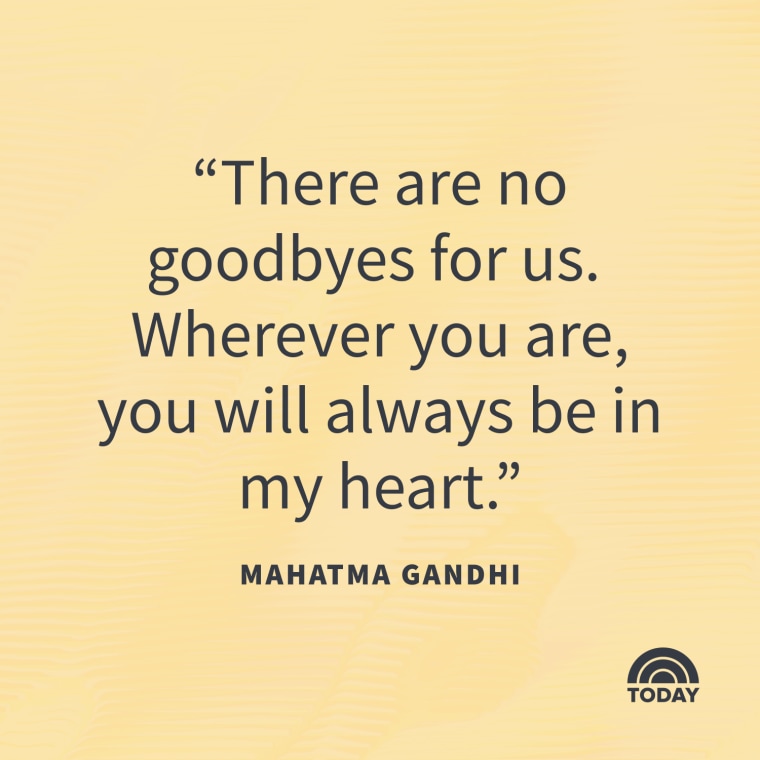
- "Sometimes people are beautiful. Not in looks. Not in what they say. Just in what they are." – Markus Zusak, "I Am the Messenger"
- "The wind is us — it gathers and remembers all our voices, then sends them talking and telling through the leaves and the fields." – Truman Capote
- "The stars show us the path but the flowers travel with us." – Bhuwan Thapaliya
Short condolence messages for the loss of any loved one
- The candle may go out, but the memory of its light remains.
- We’ve shared so much through the years and I’m here now to share the weight of your loss. Whatever you need, I’m standing by.
- Our/my heartfelt condolences for your loss.
- Our/my thoughts are with you during this sad time.
- Words of sympathy feel inadequate in expressing grief and sorrow for a loss so great. Sending a warm embrace and all my love during this sad time.
- Wishing you peace and comfort in these difficult days.
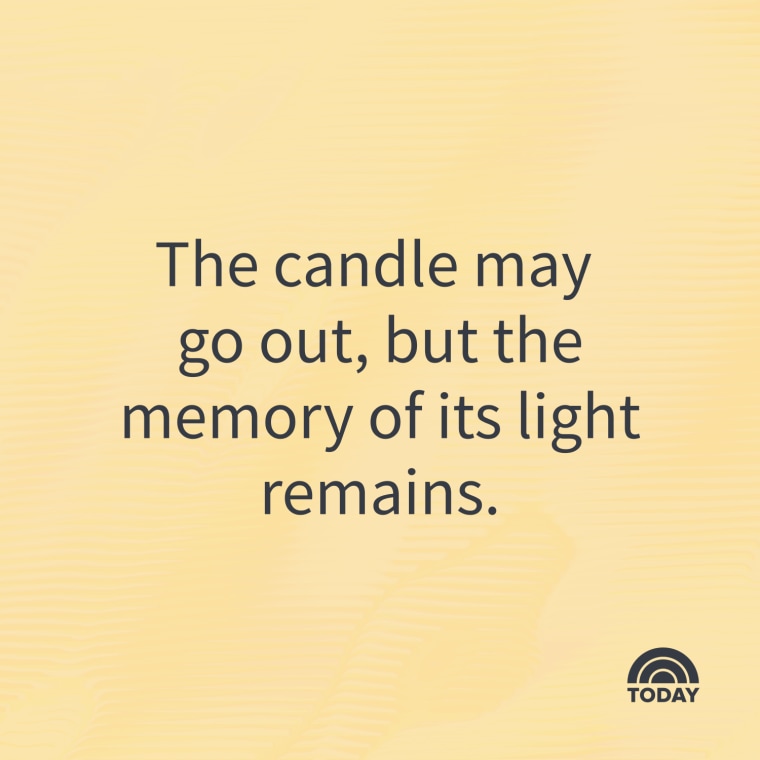
- I’m here to lend an ear or shoulder should you need one.
- Even when we can’t see them, the stars still shine. Deepest sympathy.
- I’m so sad for your loss. Thinking of you.
- Sharing in your sorrow and here for you in the days ahead.
- Thinking of you and sending my love during this difficult time.
- My heart goes out to you and your family. My deepest condolences.

- Sending thoughts of comfort and all my love.
- If you were here, I’d give you a hug. I’m so sorry for your loss.
- With love and remembrance, we share in your sorrow.
- There are no words for such a sad time. My condolences.
- Caring thoughts are with you during this difficult time.
Condolence messages for the loss of a friend or coworker

- Those we love never truly leave us. Sending our love and sympathy to you.
- Sending you strength and support during this difficult time.
- I wanted to reach out and let you know that I’m here for anything you need. I’m so sorry for your loss.
- In this sorrowful time, sending thoughts of comfort and hope that you find strength to get through the difficult days ahead. We’re here for you.
- I share in your grief and send you all my love in this time of sadness.
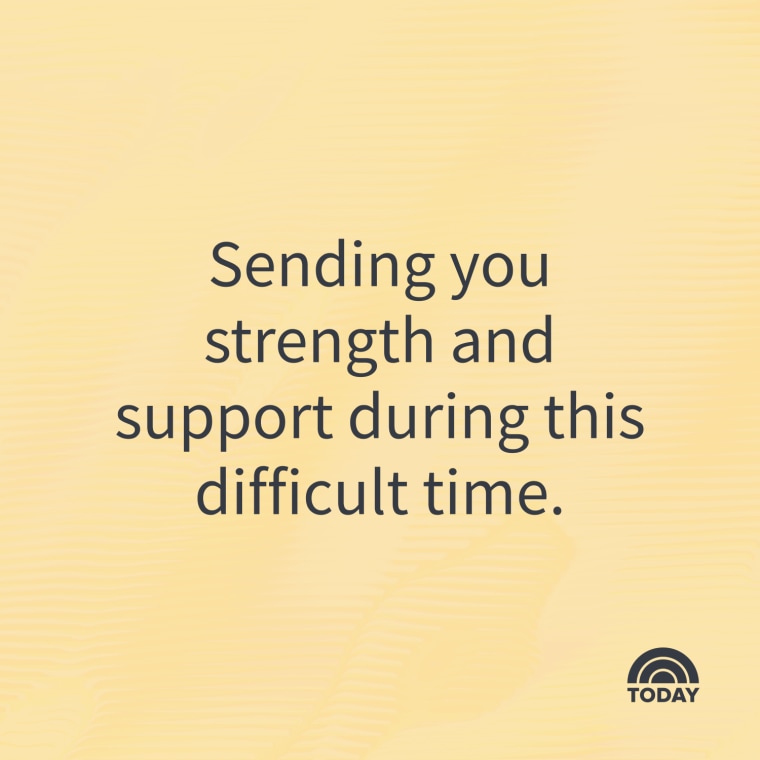
- Our deepest sympathy to you and your family. Hoping that the support of loved ones brings you comfort during this sad time.
- A hug from me to you to let you know that today and every day, you are in my heart and thoughts. I’m so sorry for your loss.
- Gone, but never far from our hearts. Deepest sympathy for your loss.
- You need only look in your heart to find what is lost. Sending our condolences to you and your family.
- If there wasn’t so much love, it wouldn’t be this hard to say goodbye. Our thoughts are with you.
Condolence messages for the loss of a parent
- Your mom was the brightest light in a sky full of stars. Sending love and support during this hard time.
- There’s nothing to say to ease the loss of a mother. We are here for you and send our deepest sympathy to you and your family.
- In loving memory of your mom. Thinking of you and hoping you find peace and strength in the days ahead.
- Mothers never truly leave us. You need only look in your heart and she’ll be there. So sad for your loss.
- Wishing you comfort and remembering the kind spirit that was your mom. Our condolences for your loss.
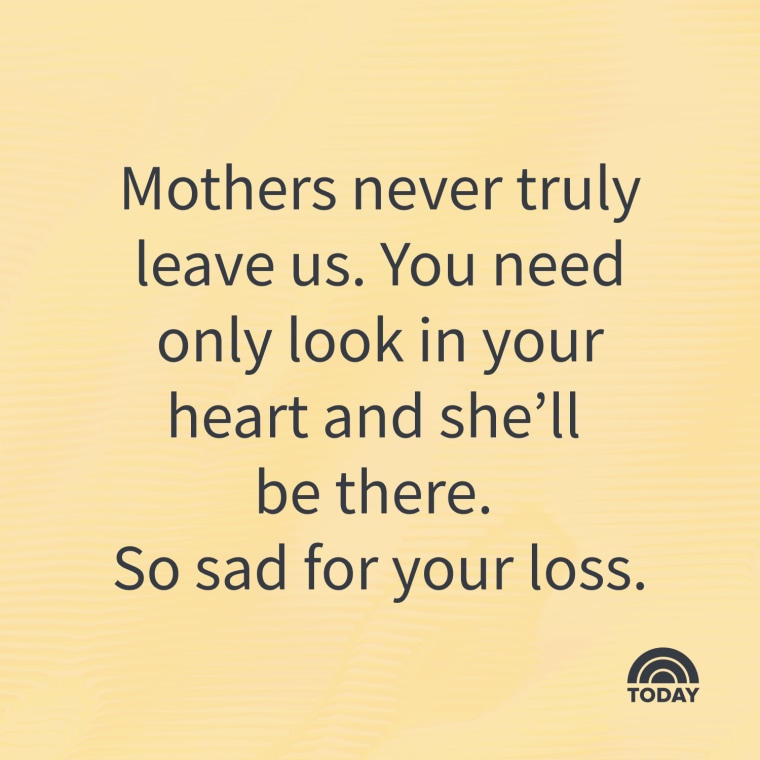
- May you find peace and comfort in your father’s memory.
- Though I didn’t know your father, I know you and that means he must have amazing. I’m so sad for your loss.
- There isn’t anyone I know who didn’t look up to your dad. He was one of the kindest, most genuine people I ever met. My thoughts are with you and your family during this difficult time.
- May you always feel his hand on your shoulder and hear his laugh echo in your heart. Our heartfelt condolences for the loss of your father.
- It’s hard to say goodbye and even harder when it’s to someone like your dad. He was one-of-a-kind and will be missed by everyone.
Condolence messages for the loss of partner
- In loving memory of your husband, a person whose kindness and generous spirit touched the lives of everyone who knew him. He will be so missed.
- When something like this happens, it leaves everyone figuring out how to pick up the pieces. There are no words, only love and support during this sorrowful time. I am here for you.
- Our deepest condolences on the loss of your beloved husband. He leaves behind an eternal flame in our hearts. Our thoughts are with you.
- Even when we cannot see the sun, it is still there, shining down from the sky and spreading its warmth so that we may one day bask in it again.
- There are no words for the loss of your wife, a person who was cherished by everyone who knew her. Our thoughts and love are with you in this time of sorrow.
- She shined so bright that the memory of her light will never dim. Sending strength and comfort.
- Everyone who knew her considered themselves lucky, myself included. I’m here to offer an ear or shoulder should you need one.
- In loving memory of your wife: She was loved deeply by everyone who knew her. Hoping the support of friends and family bring you comfort at this difficult time.
Condolence messages for the loss of a family member
- Although I never met your sister, I feel like I knew her through you. I’m so sad for your loss and wish you strength in the days ahead.
- Your sister was sincerely one of my favorite people and I know she was yours, too. Hoping the love of friends and family see you through this sad time.
- In heartfelt memory of your loved one, someone who brought a smile to every occasion. Thinking of you.
- Brothers are special. Yours was exceptional. Wishing you peace and comfort at this sad time.
- Thinking of your cousin and how much you loved him/her. There’s nothing to say for a loss so great. Our condolences at this sad time.

- We are saddened to learn of your loss. Please know that we’re thinking of you and are here for anything you may need.
- Remembering your grandmother/grandfather with love at this sad time. Sending condolences to you and your family.
- My condolences on the loss of your uncle. I know how special he was to you and hope you find peace during this sad time.
- Your (loved one) was completely outrageous — in all the best ways possible. It’s hard to imagine a world without them in it. They leave behind so many wonderful memories, which I hope brings you comfort during these difficult days.
- With a loss so great, there are simply no words to ease the pain. If there were, I would use them now. Please know that I’m here.
Find the right words for any occasion
- Birthday wishes to send to all the special people in your life
- Retirement wishes to celebrate a job well done
- The best wishes to write in a wedding card
Sarah is a lifestyle and entertainment reporter for TODAY who covers holidays, celebrities and everything in between.

What are life path numbers? Here's how to calculate yours
Inspiration.

75 affirmations for self-love when you need a confidence boost

150 deep questions to take your relationship to the next level
Relationships.

79 Father's Day Instagram captions to show Dad just how much you care

56 Mother's Day songs to honor the special mom in your life

105 truly funny jokes that'll make you laugh yourself silly

134 funny quotes that are laugh-out-loud good

101 beachy Instagram captions that bring on the good vibes

77 best summer songs to listen to with the windows down

101 summer Instagram captions that celebrate fun in the sun

- Find Local Vendors
- MAKE A MEME-ORIAL™
- Talking About Funerals
- Post-Death Paperwork
- Burials & Grave Markers
- Cremation & Urns
- Funeral Homes
- Everything You Need to Know
- Poems & Readings
- Procession & Pallbearers
- A Fitting Farewell
- Search Directory
- Write a Will
- Expressing Grief
- Coping With Holidays
- Parent / Grandparent
- Miscarriage / Stillbirth
- Partner / Spouse
- Grieving Children
- Grieving Adults
- Spirituality
- Inspiring Stories
- Healing Music
- Learn How to Make a Meme-orial
- Login to My Meme-orial Account
- Craft Videos
- Memorial Trees & Benches
- Cremation Jewelry
- Beautiful Memes to Share
- Celebration of Life Ideas
- Are You A Business? List In Our Directory Today
love lives on
Life . love . legacy.
The resource centre for when you’ve lost someone you love
FIND LOCAL SERVICES
Condolences | 275+ Best Messages You Can Use
Wondering how to express condolences after someone has died?
Whether you are offering condolences in person, or writing condolences in a sympathy card, we’ve got you covered with the Ultimate Guide to Condolences.
In Condolences 101, you’ll soon be on your way with straight-to-the-point advice on:
My Condolences: Choosing the Right Sympathy Card
How to write condolences, how to express condolences in person.
We’ve also summarized this information into a helpful infographic so that you can easily share it on social media or save it to your Pinterest page.
Next, you’ll find perfect condolence messages and quotes for the sentiment that you wish to express: sincere condolences; heartfelt condolences; deepest condolences; or Christian condolences.
For ease of reference, we have organized this collection by the type of loss:

Condolences for Loss of Mother
Condolences for loss of wife, condolences for loss of father, condolences for loss of husband, condolences for loss of son, condolences for loss of daughter, condolences for loss of baby, condolences for loss of sister, condolences for loss of brother, condolences for loss of grandfather, condolences for loss of grandmother.
We hope that you find the Ultimate Guide to Condolences helpful in expressing messages of sympathy, support and encouragement to someone who’s grieving.

When you’ve lost a loved one, it helps to know that other people are thinking of you during your time of loss and grief.
While a personal visit, particularly to the funeral or wake, is the best option, sometimes it’s not possible, especially given geographical distances. In that case, a condolence card will be greatly appreciated by the bereaved person.
Your condolence card does not need to be long. A brief, but sincere message of sympathy, will mean a lot to its recipient.
When choosing a condolence card, pick out a card that you think the recipient would appreciate the most. Consider both the picture and the messages on the card.
With respect to pictures on the condolence card, avoid cards with lighthearted pictures, like those with animals or babies. Stick with sympathy cards that have nature scenes, flowers, doves, and other images that are appropriate for the solemnity of the occasion.
You should also avoid cards with religious imagery if you, or the recipient, are uncomfortable with religious subject matter.
Some condolence cards specifically mention that type of loss on the card, for example: “Words of Sympathy for the Loss of Your Mother.”
You don’t have to choose a card that specifically mentions the type of loss, (but make sure that it doesn’t mention another relative!)
Once you have found a condolence card with a picture that you think the recipient will appreciate, ensure that you also read the message inside the card.
You need to ask yourself two questions.
First, does the sentiment inside the card match your own feelings?
For example, if you did not personally know the person that died, you should not chose a card with a pre-printed message that speaks about how much you will personally miss them.
Second, will the recipient of your condolence card appreciate the sentiment of the message?
For example, if the recipient had a complicated relationship with the deceased person, she may be upset by a card that expresses how wonderful their relationship was.
As another example, if the recipient is not religious, he may be offended by a card that speaks about heaven and the love of God.
When in doubt, choose a sympathy card with a simple message of peace and comfort.
If you cannot find a condolence card with a message or quote that is appropriate, choose a blank card instead.
Dear [Recipient’s Name] :
[I/We] are so sorry to hear about the passing of [Deceased’s Name] . [He/She] was a good [Type of Relationship] to us, and will forever be missed. Our favourite memory of [Him/Her] is the time when [Share Story] . Please accept our deepest condolences.
Love, [Your Name]
Many people are afraid to say the “wrong thing” to someone who’s grieving. Speak from a place of compassion and love. Share how much you miss the person who died. Share your favourite memories of him/her. Don’t deny that the person is gone, or that there is deep emotional pain because of the loss, or that life is forever changed.
Don’t say:
- “I know how you’re feeling.”
- “S/he is in a better place.”
- “Now you can start moving on with your life.”
- “It’s part of God’s plan, so you should accept it.”
- “You’ll feel better soon. Life goes on.”
- How much you miss him/her.
- Special memories.
(Click infographic to for full resolution)
![condolence visit meaning [Infographic] Condolences: How to Express Condolences](https://www.loveliveson.com/wp-content/uploads/2018/01/SOM_INFO_How-to-Express-Condolences_05_2018.jpg)
Like our infographic? Share it on your site by copying this code:
![condolence visit meaning [Infographic] How to Express Your Condolences](https://www.loveliveson.com/wp-content/uploads/2018/01/SOM_INFO_How-to-Express-Condolences_05_2018.png)
These condolences for loss of a mother attempt to express how important mom is, and the depth of love she had for her children. We hope you find a fitting sympathy message in our list of examples that you can use today.
Short Condolence Messages
These short condolences are perfect for a text message, a message on a social media platform, like Facebook, as well as on a card accompanying a sympathy bouquet:
- A mother is with us always, first in her lifetime, then forever in our memory.
- You and your family are in my heart and mind. My deepest sympathies on the passing of your mother.
- I’m glad to have gotten to meet your mother. My condolences go out to you and your family.
- Most people only have one mom, and that is why moms are so special. I’m so sorry for your great loss.
- Your mother will be greatly missed, and we are sorry for your loss.
- I am one of the many lives that your mother touched during her life. I’m sorry for your loss.
Sincere Condolences
These messages all offer ‘sincere condolences’ and can be used in a sympathy card or in a condolence letter. These messages are most appropriate when the recipient of your correspondence is an acquaintance:
- Sincere sympathies to you and your family. Moms live in a special place in the hearts of their children. That’s why mothers will continue to live even after they pass on.
- She feeds us, teaches us, loves us, spends time with us. When she leaves us, she lives on through us. Please accept my sincere condolences for your loss.
- My sincere condolences go out to you and your family. I’m grateful for being able to get to know your mother, and I’m comforted in the knowledge that there are many other people who felt and remember her amazing influence.
- I extend my sincerest sympathies to you and your family. What I remember most about your mother was her wisdom and warm-heartedness. She was patient and never seemed to speak ill of others.
- We will all miss your mom. Your mom was a wonderful woman who role-modeled what it means to live life well. She was a dynamic person and a pleasure to know. Please accept our sincere condolences for your loss.
Heartfelt Condolences
If you have a close relationship with the recipient of your sympathy card or condolence letter, consider using a message of ‘heartfelt condolences’:
- Your mother was the type of person who inspired integrity in those around her; she encouraged others to be the best people they could be. That’s reflected in your life. Please accept my heartfelt sympathies for your loss.
- Your mom was a beautiful woman in her personality, integrity, and actions. Please accept my heartfelt condolences.
- My heartfelt condolences go out to you and your family. As a long-time friend of your mother’s, I know how special of a person she was. I feel a great loss at this time.
- Mothers hold a special place in their hearts for their children, and children hold a special place in their hearts for their mothers. I’m sorry for the hole that you have now. My heartfelt sympathies for your great loss.
- Your mother’s light shone brightly on those she loved during her luminous life. Please accept my heartfelt condolences during this sad time.
Deepest Condolences
Offer your ‘deepest condolences’ when trying to express how much the deceased person meant to you:
- My deepest condolences go out to you and your family. Moms are special people, especially ones like yours. From the time I spent with her, I could tell she was an amazing lady.
- I extend my deepest sympathies to you and your family. I admire the life that your mom lived, and I can only hope that I have as positive impact on the lives of others that she did.
- I am blessed to have known your mother. She was truly a blessing in my life and I will miss her greatly. It is an honor to call your mother my friend. My deepest condolences to you and your family.
- Please accept my deepest sympathies. Just know that I am here for you, and will be dropping by to see how you are doing. Please also don’t hesitate to reach out when there is anything that I can help you with. Great people such as your mother are an inspiration to everyone around them. Your mother will continue to be an inspiration for me, even though she has passed. She will live on in my memory and thoughts.
- You and your family are in my heart and mind. My deepest condolences on the passing of your mother. Your mother was one of the warmest and most caring people I have had the pleasure of knowing. I am sorry for your great loss.
Christian Condolences
If both you and the recipient of your condolence card or letter are devout Christians, using a religious message of sympathy is appropriate:
- I’m praying that God grants you strength at this time, and that He gives you comfort and healing after the loss of your mother.
- My condolences go out to you and your family for the loss of your mom. I don’t know what you are feeling right now, but I do know that God will be with you always.
- I am so sorry to hear about the passing of your beautiful mother. May the Good Shepherd bless and keep you and give you peace.
- Your mother was such a special lady. God called home another great servant and saint. My deepest sympathies go out to you and your family.
- Please accept my deepest sympathies for the passing of your special mom. We are praying that your broken heart is healed through God’s never-ending love.

These sympathy messages are appropriate for the loss of a wife. These condolence examples acknowledge how difficult it is to lose a partner and a best friend.
These short condolences are perfect for a text message, a message on a social media platform, like Facebook, as well as on a card accompanying a sympathy flower arrangement:
- Please accept our sincere sympathies for the passing of your beautiful wife. No one can ever take her place in our hearts.
- Please accept our deepest and most heartfelt condolences for the loss of your wife. We will always remember her warmth, humour, and love.
- I extend my heartfelt condolences for the loss of your wife. I miss her too, and stand with you during your time of grief.
- My deepest condolences for your loss. Your wife was a wonderful lady and we will all miss her very much.
- I was so very sorry to hear of your wife’s passing. She was well liked and respected by all of us who knew her. You have my deepest sympathies.
These messages all offer ‘sincere condolences’ and can be used in a condolence card or letter. These messages are most appropriate when the recipient of your correspondence is an acquaintance:
- We were shocked and heartbroken to learn about the passing of your wife. Her death is a deep blow to all of us, and her absence will be keenly felt. Please accept our sincere sympathies.
- Your wife was one-of-a-kind, and even though she is gone, she will never be forgotten. I will always treasure my memories of her. Please accept my sincere condolences for your loss.
- Please accept our sincere sympathies for the death of your amazing wife. We know that this time is really tough for you, as you’ve not only lost your partner you’ve also lost your best friend. Please let us support you during your journey of grief. She would want us all to be there for each other.
- I was so shocked and heartbroken to hear the news of your wife’s passing. I am so very sorry. My family and I extend our sincere condolences. Your wife was a tremendous person. She was gracious and helpful to everybody, and probably the kindest person we’ve ever known. We will miss her terribly.
- I was shocked and saddened to hear of your wife’s passing. I knew that she had been ill, but was hoping she would recuperate. You have my very sincere and deep condolences on such a tragic loss.
If you have a close relationship with a man that has lost his wife, consider using a message of ‘heartfelt condolences’ in your sympathy card or in a condolence letter:
- We will all miss your wife who was an inspiration to all of us. Through her we got to know what real family is all about. We give you our heartfelt condolences at this sad time.
- Please accept my heartfelt sympathies for the death of your beloved wife. Words cannot fully express the sorrow I feel about her passing. May you always treasure the wonderful times you shared with her. My prayers are with you and your whole family during this difficult time.
- Please accept my heartfelt condolences for the loss of your beloved wife. I am here for you and you are not alone.
- This card is sent with our heartfelt sympathies for the passing of your beloved wife. Please know that we are thinking of you and your family during this difficult time and share your grief. She was a true friend and we will all miss her terribly.
- Please accept my heartfelt sympathy on the loss of your wife. I know you had a great marriage and loved her so much. I share your grief at this very difficult time, but treasure the wonderful memories I have of her.
If you had a close relationship with the deceased person, or her family, using ‘deepest condolences’ in your sympathy card or letter expresses how much you value the friendship:
- Your wife’s death has left a deep void in our lives and we mourn her passing with you and your family. She was an amazing person, and will be forever missed. Please accept our deepest condolences.
- I am so sorry for the loss of your beloved wife. Please accept my deepest sympathies. Through this time of pain, I just want you to know that I am here for you and your children. Whatever you need, don’t hesitate to call me, day or night.
- We send our deepest condolences to you for losing someone as special as your wife. We share your pain and grief, and want you to know that we are always here for you and your children. Just call whenever you need us, even if it’s just to sit quietly with you. We’ll also be dropping by on a regular basis to check in with you all.
- I was shocked and saddened to learn of your wife’s passing. She was a genuinely warm and loving person who enriched the lives of everybody she came into contact with. I feel very blessed to have known her. Please accept my deepest sympathies.
- Sorrow, shock and disbelief – that is what I feel right now after learning about the death of your wife. Please accept my deepest condolences, and know that you can count on me for anything, now and always. You are not alone – I am here for you.
If you are looking for a Christian message of condolence, look no further. These messages are perfect for sympathy cards to people who are known for their faith:
- May God strengthen you and your family as you come to terms with the death of your wife and may you find courage to face the days ahead without her. Please accept my sincere sympathies for your great loss.
- God broke the mold when He made your amazing wife. Her life, love and faith were a great inspiration to us. We will miss her deeply, and our prayers and love are with you and your family. Please accept our deepest condolences.
- Through the years that we knew your wife, we shared laughter and joy, and now we share your grief and pain at her passing. May God comfort you and bring you healing. Please accept our heartfelt condolences, as well as our help in whichever way you may need it.
- Receiving news of your wife’s death was devastating and I cannot begin to image your pain and sorrow. May God comfort you and hold you in His arms. And never forget that I am always here for you. Please accept my deepest sympathies.
- Please accept our deepest condolences for your loss. Walking through life without your beloved wife will be difficult. Try and take it one step at a time. We are here to support you, and we pray that God will guide you each step of the way.

Losing a father is unimaginably difficult for a son or daughter. Here are examples of sympathy messages that you can use if you are writing a condolence card for someone who has lost a beloved dad.
These short condolences are perfect for a text message, a message on a social media platform, like Facebook, as well as on a card accompanying sympathy flowers.
- Please accept our heartfelt condolences. Your father was a wonderful man, and he will be greatly missed.
- I am truly sorry for the loss of your father. There are no words to express how much he meant to me. My heart is aching.
- No matter where your dad is, he’ll always be watching over you. He will stay with you forever.
- I am so sorry to hear about the loss of your father. If you feel like talking to someone, know that I’m a good listener and will always be there for you.
- We are deeply and sincerely sorry for the loss of your amazing father.
These messages all offer ‘sincere condolences’ and can be used in a sympathy card or in a longer letter of condolence. These messages are most appropriate when the recipient of your correspondence is an acquaintance:
- Your father was so proud of you, and lit up whenever he spoke about you. I hope you know that you meant the world to him. He was a wonderful man and will be truly missed. Please accept our sincere condolences for your loss.
- I am really sorry for the loss of your father. Please accept our sincere condolences. I know how close you were to him, and what a profound influence he had on your life. We will all miss him greatly.
- Please accept our sincere sympathies for the loss of your dad. I hope it brings you comfort to know that we share your grief. He was a wonderful man and will be sorely missed.
- Your father may have passed on, but his love and legacy will live forever. He had a positive influence on the lives of his family, friends, and his community. Please accept our sincere condolences for your loss.
- Losing your dad is a profound loss. He was a source of strength and unfailing love and support. Words cannot express how truly sorry I am for your loss. Please accept my sincere condolences.
If you have a close relationship with the recipient of your sympathy card or in a condolence letter, consider using a message of ‘heartfelt condolences’:
- I cannot tell you how sorry I was to hear about your dad. I was shocked and saddened by the news. Please extend my heartfelt sympathies to your Mom and the rest of your family, and know that I will always be here for support.
- Life sometimes isn’t fair, and this is one of those times. Your father was a wonderful person, and I will miss him terribly. I will treasure my memories of him always. Please accept my heartfelt condolences for your loss.
- Your dad was a wise man, but also had a great sense of humor. He will be missed greatly and remembered often. Please accept our heartfelt condolences, and know that we are here for you, now and always.
- Please accept my heartfelt sympathy on the passing of your dad. I will always remember him as the hard working and decent man that he was. My thoughts and prayers are with you during this sad time.
- Your father gave me the greatest gift anyone can give another person — he believed in me. I will always consider him to be an important mentor and friend. I was so lucky to know him, and will always strive to help others in the way he helped me. Please accept my heartfelt condolences for your loss.
- Your father was one of the nicest people I know, and it was obvious that he was a great dad too. You have my deepest sympathy – I wish he were still here with us. He may be gone, but he’ll never be forgotten.
- I was so sorry to hear about your father’s passing. I know this is a very sad and difficult time for you and your family. He is irreplaceable. You have my very deepest sympathy for your great loss.
- Please accept my deepest condolences to you for the passing of your dad. There will never be another man like him. He was definitely one-in-a-million, and we were all lucky to know him.
- Your father was always there for my family and I growing up. He was so giving and thoughtful. He will live on in our hearts forever. Please accept my deepest condolences at this heartbreaking time.
- I am sending you my deepest condolences for the loss of your dad. My heart aches because he is no longer with us. He was such an amazing father to you and your siblings, and a wonderful role model for me as I was growing up. I learned so much from him, and I’ll always remember his words of wisdom. I’ll call you soon to see if there is anything I can do to support you during this difficult time.
Is the recipient of your condolence card or letter a devout Christian? If he or she is a spiritually-minded person, a sympathy message that references Biblical promises and your prayers will be appreciated:
- Please accept my heartfelt sympathies for the loss of your dad. I will keep you close in my thoughts and prayers during this difficult time. I pray that you feel God’s care and love, as well as the support of us all.
- Although no words can really help ease your grief, just know that you are very close in every thought and prayer. I admired your dad for his strength of character and his faith. I will continue to be inspired by the noble life that he lived. I am truly blessed to have known him. Please accept my deepest condolences.
- I am praying that you feel God’s unfailing love during this heartbreaking time. Please accept my sincere sympathies for the loss of your wonderful father.
- My condolences go out to you and your family for the loss of your dad. I don’t know what you are feeling right now, but I do know that God will be with you always.
- I am so sorry to hear about the passing of your wonderful father. May the Good Shepherd bless and keep you and give you peace.

The death of a beloved husband is one of life’s greatest sorrows. These condolence message examples acknowledge the void that is left in a family and in our community when we lose a wonderful man.
These short condolences are perfect for a text message, a message on a social media platform, like Facebook, as well as on a small card accompanying a bunch of condolence flowers:
- I am so very sorry for your loss. Your husband was a good man. We share your grief at this very sad and difficult time.
- I was so deeply saddened to hear of your husband’s passing. He was a wonderful man. You have our deepest sympathy.
- I was very sorry to hear the news about the passing of your precious husband. I am deeply saddened by your loss.
- I’m so very sorry about the loss of your husband. I will stop by later this week to see what I can do to help during this difficult time.
- Please accept our heartfelt condolences. Your husband was a wonderful man, and he will be greatly missed.
These messages all offer ‘sincere condolences’ and can be used in a sympathy card or in a condolence letter. These messages are most appropriate when the recipient of your correspondence is an acquaintance:
- I offer my sincere condolences for the loss of your dear husband. I was so shocked to hear of his passing and want you to know how very sorry I am. I didn’t know him very well, but from all you told me he was a loving husband and good father. I know that whenever his name was mentioned in our circle of friends, everyone had such nice things to say about him. Your children are such shining examples of the great job that both of you did in raising them. They will always be a constant reminder of his love and influence on them. Please let all of your family know how deeply saddened I am.
- It was such a shock to hear of your husband’s passing. I am still trying to process this tragic news. Your husband was so well thought of by everyone who knew him and he will be greatly missed. You have my very sincere condolences.
- We were shocked and heartbroken to learn about the passing of your husband. His death is a deep blow to all of us, and his absence will be keenly felt. Please accept our sincere condolences.
- Your husband was one-of-a-kind, and even though he is gone, he will never be forgotten. I will always treasure my memories of him. Please accept my sincere condolences for your loss.
- Please accept our sincere condolences for the death of your amazing husband. We know that this time is really tough for you, as you’ve not only lost your partner you’ve also lost your best friend. Please let us support you during your journey of grief. He would want us all to be there for each other.
If you have a close relationship with someone that has lost a husband, consider using a message of ‘heartfelt condolences’ in your sympathy card or in a condolence letter:
- Please accept my heartfelt condolences on your husband’s passing. I know you had a great marriage and loved each other very much. I share your grief at this tragic loss. I will always treasure my memories of him.
- We will all miss your husband who was an inspiration to all of us. Through him we got to know what real family is all about. We give you our heartfelt condolences at this sad time.
- Please accept my heartfelt condolences for the death of your beloved husband. Words cannot fully express the sorrow I feel about his passing. May you always treasure the wonderful times you shared with him. My prayers are with you and your whole family during this difficult time.
- Please accept my heartfelt condolences for the loss of your beloved husband. I am here for you and you are not alone.
- This card is sent with our heartfelt condolences for the passing of your beloved husband. Please know that we are thinking of you and your family during this difficult time and share your grief. He was a true friend and we will all miss him terribly.
Did you have a close friendship with the man that passed away? It is appropriate to offer his wife or partner your ‘deepest condolences’ on their loss:
- I was so deeply saddened to hear of your husband’s passing. I am so very sorry. Your husband was such a wonderful man, with great wit and charm. He was truly one-in-a-million. You have my very deepest sympathy.
- We were both shocked and saddened to hear of your husband’s death. My family and I have such fond memories of him from all those very wonderful times our families spent together on vacation. It was a very special time for us and we will always remember him and the good times we shared. You have our deepest condolences on this very tragic loss. We will be calling on you to see if there is anything that we can do to support you and your family.
- I was very sorry to hear of your husband’s passing. He was a wonderful man and I thought the world of him. You have my deepest condolences. I hope that knowing that others share in your grief will bring you some consolation.
- I was very sad to hear of your husband’s death. The community has lost one of its very best people. He will be long remembered for all the good works he did, for his kindness and generosity. My deepest sympathy is with you and your family at this very sad and difficult time.
- Your husband was one of the nicest people I know, and it was obvious that he was a great dad too. You have my deepest condolences – I wish he were still here with us. He may be gone, but he’ll never be forgotten.
- With the death of your loving husband, the days ahead may seem bleak and dark. Our prayer is that God will shine His light and guide you through each and every one of them. Please accept our sincere condolences.
- Please know that you have my deepest sympathy on the loss of your husband. I know that there is little I can say to console you, but please know that my thoughts and prayers are with you and your family. May God bring you comfort and hope during this difficult time.
- Words are inadequate at a time like this, but I wanted you to know how very sorry I am that your husband has passed away. The loss of a spouse and best friend is a tragic event, and I cannot imagine the pain and suffering you are experiencing. It is times like this that our faith is put to the test. The Bible does promise: “Blessed are those that mourn for they shall be comforted.” I pray that this will be especially true for you as you mourn your loss. I pray that God will give you the strength to see you through this sad and difficult time. My thoughts and prayers are with you all.
- My thoughts and prayers are with you and your wonderful family as you mourn the loss of your husband. I pray that God will grace you with peace and comfort in the days ahead.
- I hope that the faith that has guided you in so many difficult times will strengthen you as you mourn the loss of your husband. He was a good man and a servant of God in all that he did. Please know that I will be praying for you and the children that you will all find the peace and comfort in this tragic time. I know that God will answer our prayers.

Related Articles

The pain and grief that comes with losing a beloved son is unimaginable. Here are messages of condolences that you can use when writing to bereaved parents.
- Words cannot express how sorry we are for the loss of your son. Please know you and your entire family are in our constant thoughts.
- I heard the terrible news about your son’s passing. I want to offer you my deepest condolences and let you know that you are in my prayers.
- Please know that you have my sincere sympathies in this difficult time. I am so sorry for the loss of your son.
- I offer you my sympathies for the loss of your son. He was a wonderful person, and meant the world to me.
- We just heard the heartbreaking news that your beloved son has passed away. Please accept our sincerest and deepest condolences.
These messages all offer ‘sincere condolences’ and can be used in a sympathy card or letter. These messages are most appropriate when the recipient of your correspondence is an acquaintance:
- While the loss of a loved one is never easy, even when anticipated, it is most certainly the hardest when they are taken from us too soon. We offer our sincere condolences for the loss of your beloved son. Our thoughts are with you during this most difficult of times.
- Please accept my sincere condolences for the loss of your son. He was such a wonderful man, and I’m deeply saddened by his sudden passing. I know how close the two of you were, and I know just how this loss has hurt you to the core. I want you to know that I will be here for you to hold your hand and help you get through the difficult days. I know that it will not be easy, but we will just take it one day at a time.
- I just heard the most heartbreaking news that your son has passed away. Please accept my sincere sympathies. He was such a good man, and was known for his kindness and generosity. It’s only been a few days, but I miss him terribly already. If there is anything I can do to help you during this difficult time, please allow me to help.
- You have my sincere condolences for the loss of your wonderful son. This time is most difficult and it’s hard to see beyond the anguish that you feel. Over time, I hope that the special memories that you shared with your son will bring you some peace and comfort. He was a good boy with a heart full of love. I will forever remember his cute and mischievous ways, and he will be missed today and always.
- We send our sincere condolences for the loss of your wonderful son. We know how deeply you must be grieving, and how much you must miss him. We will check in on you and see if there is anything practical we can do to help you at this difficult time. Please know that there is nothing we would not do to support and comfort you. You are never alone.
- Please accept my heartfelt condolences for the passing of your son. It was obvious to everyone how close you were with him, and how much he loved his family. I cannot image the pain and grief you feel because of this tragic loss. I can only hope that you find some comfort in your precious memories of him, and in knowing that we all miss him too.
- You have our heartfelt condolences at this most challenging time. There’s nothing more devastating than losing a child. Please know that if there’s anything that I can do to make things a little more bearable for you, I’m only a phone call away.
- I’m sending you my heartfelt condolences for the loss of your boy, along with all my love. Losing a son is immensely painful, I cannot even begin to imagine the depth of your grief. If you ever need someone to cry with, talk with, or just sit in silence with you, I’ll be there in a heartbeat.
- I’m devastated that your son is no longer with us. Please accept my heartfelt condolences for your loss. Your son was the most incredible person I’ve ever met. He was a good friend, and he was more like a brother to me. It hurts to think that I will no longer be able to see him, talk to him, or spend time with him. But I know that he’ll live forever in the hearts of the people who loved him.
- News of your son’s passing has shocked our entire family. He was an amazing person, loving and caring, and it’s hard to accept that he is no longer in our lives. He was a true blessing to our whole family, and to everybody who was blessed to know him. Please accept our most heartfelt condolences for your loss.
- Please accept our deepest condolences on the loss of your son. He was a wonderful person, and had a fantastic sense of humor. We will never forget his great smile. May your precious memories sustain you and bring you comfort during this difficult season.
- We send you our deepest sympathies for the passing of your beloved son. We wish you peace as you come to terms with your loss. Please know that you’re surrounded by people who love you, and who want to support you during this difficult time. You do not have to go through this journey of grief alone.
- Please accept our deepest condolences for the death of your son. He was always a good friend to me. I will always remember how loyal he was, and how he would always go the extra mile to help out someone in need. He often spoke of how much his parents meant to him. Everyone who knew him consider himself or herself lucky and blessed.
- I write to you today to express my deepest condolences for the loss of your son. I knew your son from way back, and I can honestly say that he was one of the finest and bravest men I have ever met. He was a best friend and a brother to me, I will always treasure my memories of him.
- We cannot image the grief you must feel because of your son’s passing. Please accept our deepest condolences. We hope that you will find a measure of comfort in knowing that he was an incredible person who brought much joy to the lives of others. Knowing him was a true blessing, and we will always treasure the special times we spent with him.
Have friends from church lost their son? They would appreciate receiving a sympathy card or letter from you with Christian condolences:
- We send our heartfelt sympathies for the loss of your son. What you are going through is indescribably painful and agonizing, but never forget that God is close to the broken-hearted. I share your pain, and pray that God brings you comfort and healing.
- Nothing can take away the special memories that you and your son shared. I know that grief like this never ends because he was someone that you truly and deeply loved. He loved you too, and cherished having you as a parent. May God give you the grace to accept what has happened and the serenity to carry on living. Please know that I am here for you always.
- I’m very sorry for the loss of your beloved son, and I hope you know that I’m praying that God gives you His peace, comfort and strength in these trying times. Always remember that when life is darkest, God is closest. He will always take care of you. Please let me know if there’s anything that I can do to make things easier. I would love to help in any way that I can.
- Our God is a magnificent God. He is bigger than our biggest fears and our deepest grief. I know that your faith is strong, and hope that you are able to cling to Him during this difficult time. God is with you now and always, and carries you in His everlasting arms.
- Please accept our deepest sympathies for the loss of your son. He certainly touched many lives, and we are devastated that he is no longer with us. May you feel God’s unfailing love during these difficult days, and may He bless you with healing and peace.

No words can truly express how difficult it is to lose a beloved daughter. Here are messages of condolences that you can use when writing to bereaved parents.
These short condolences are perfect for a text message, a message on a social media platform, like Facebook, as well as on a card accompanying sympathy flowers:
- Words cannot express how sorry we are to hear of your daughter’s passing. Please know you and your entire family are in our constant thoughts.
- I heard the terrible news about your daughter’s death. I want to offer you my deepest condolences and let you know that you are in my prayers.
- Please know that you have my sincere sympathies in this difficult time. I am so sorry for the loss of your daughter.
- I offer you my sympathies for the loss of your daughter. She was a wonderful person, and meant the world to me.
- We just heard the heartbreaking news that your beloved daughter has passed away. Please accept our sincerest and deepest condolences.
- While the loss of a loved one is never easy, even when anticipated, it is most certainly the hardest when they are taken from us too soon. We offer our sincere condolences for the loss of you beloved daughter. Our thoughts are with you during this most difficult of times.
- Please accept my sincere condolences for the loss of your daughter. She was such a wonderful person, and I’m deeply saddened by her sudden passing. I know how close the two of you were, and I know just how this loss has hurt you to the core. I want you to know that I will be here for you to hold your hand and help you get through the difficult days. I know that it will not be easy, but we will just take it one day at a time.
- I just heard the most heartbreaking news that your daughter has passed away. Please accept my sincere sympathies. She had such a big heart, and was known for her kindness and generosity. It’s only been a few days, but I miss her terribly already. If there is anything I can do to help you during this difficult time, please allow me to help.
- You have my sincere condolences for the loss of your wonderful daughter. This time is most difficult and it’s hard to see beyond the anguish that you feel. Over time, I hope that the special memories that you shared with your daughter will bring you some peace and comfort. She was a bright, shining light in all of our lives, and she will be missed today and always.
- We send our sincere condolences for the loss of your wonderful daughter. We know how deeply you must be grieving, and how much you must miss her. We will check in on you and see if there is anything practical we can do to help you at this difficult time. Please know that there is nothing we would not do to support and comfort you. You are never alone.
If you have a close relationship with someone that has lost a daughter, consider using a message of ‘heartfelt condolences’ in your sympathy card or in a condolence letter:
- Please accept my heartfelt condolences for the passing of your daughter. It was obvious to everyone how close you were with her, and how much she loved her family. I cannot image the pain and grief you feel because of this tragic loss. I can only hope that you find some comfort in your precious memories of her, and in knowing that we all miss her too.
- I’m sending you my heartfelt condolences for the loss of your daughter, along with all my love. Losing a child is immensely painful – I cannot even begin to imagine the depth of your grief. If you ever need someone to cry with, talk with, or just sit in silence with you, I’ll be there in a heartbeat.
- I’m devastated that your daughter is no longer with us. Please accept my heartfelt condolences for your loss. Your daughter was the most incredible person I’ve ever met. She was a good friend, and was more like a sister to me. It hurts to think that I will no longer be able to see her, talk to her, or spend time with her. But I know that she’ll live forever in the hearts of the people who loved her.
- News of your daughter’s passing has shocked our entire family. She was an amazing person, loving and caring, and it’s hard to accept that she is no longer in our lives. She was a true blessing to our whole family, and to everybody who was blessed to know her. Please accept our most heartfelt condolences for your loss.
- Please accept our deepest condolences on the loss of your daughter. She was a wonderful person, and had a fantastic sense of humor. We will never forget her great smile. May your precious memories sustain you and bring you comfort during this difficult season.
- We send you our deepest sympathies for the passing of your beloved daughter. We wish you peace as you come to terms with your loss. Please know that you’re surrounded by people who love you, and who want to support you during this difficult time. You do not have to go through this journey of grief alone.
- Please accept our deepest condolences for the death of your daughter. She was always a good friend to me. I will always remember how loyal she was, and how she would always go the extra mile to help out someone in need. She often spoke of how much her parents meant to her. Everyone who knew her consider himself or herself lucky and blessed.
- I write to you today to express my deepest condolences for the loss of your daughter. I knew your daughter from way back, and I can honestly say that she was one of the best people I’ve ever known. She was a best friend and like a sister to me, I will always treasure my memories of her.
- We cannot image the grief you must feel because of your daughter’s passing. Please accept our deepest condolences. We hope that you will find a measure of comfort in knowing that she was an incredible person who brought much joy to the lives of others. Knowing her was a true blessing, and we will always treasure the special times we spent with her.
Have friends from church lost their daughter? They would appreciate receiving a sympathy card or letter from you with Christian condolences:
- We send our heartfelt sympathies for the loss of your daughter. What you are going through is indescribably painful and agonizing, but never forget that God is close to the broken-hearted. I share your pain, and pray that God brings you comfort and healing.
- Nothing can take away the special memories that you and your daughter shared. I know that grief like this never ends because she was someone that you truly and deeply loved. She loved you too, and cherished having you as a parent. May God give you the grace to accept what has happened and the serenity to carry on living. Please know that I am here for you always.
- I’m very sorry for loss of your beloved daughter, and I hope you know that I’m praying that God gives you His peace, comfort and strength in these trying times. Always remember that when life is darkest, God is closest. He will always take care of you. Please let me know if there’s anything that I can do to make things easier. I would love to help in any way that I can.
- Please accept our deepest sympathies for the loss of your daughter. I pray that the light of God’s love shine upon you as you face the darkness of your pain and your grief. Know that God will never forsake you. He will always look after you because you are His child and He is your Father. May you be blessed with the peace and comfort that you seek during this difficult time.

The loss of a baby is one of life’s greatest tragedies. The child will never have a chance to experience the fullest of life, and his or her parents will miss out on watching him or her grow up. Here are message of condolences that are appropriate when writing to parents grieving the loss of their precious baby.
These short condolences are perfect for a text message, a message on a social media platform, like Facebook, as well as on a card accompanying a bouquet of sympathy flowers:
- I am so sorry to hear about the loss of your baby. Let me be there for you during your time of sorrow and grief. You are never alone.
- We are devastated to hear about your baby’s passing. We will miss your child’s beautiful smile and giggles, but he/she will never be forgotten.
- I’m sending you lots of love and my heartfelt sympathies on the heartbreaking loss of your baby.
- We were devastated to hear about the loss of your beautiful baby. Please accept our deepest condolences. We are here for you and share your grief.
- We send our heartfelt sympathies for the loss of your baby. There is nothing that we can say to take your pain away. Still, we hope that knowing that you are not alone will bring you some comfort.
- Brief as your child’s life was, may we ever remember the joy. Please accept my sincere condolences for the loss of your child.
- No matter how brief your baby’s life was, your precious child left a permanent footprint in all our hearts. Please accept our sincere condolences for your terrible loss.
- Please accept our sincere condolences for the loss of your precious baby. While he/she was with us only a short while, he/she touched our lives with his/her presence. We share your pain that he/she was taken from us too soon. He/she will forever be loved.
- How very quietly he/she tiptoed into our world, silently, but only a moment he/she stayed. But what an imprint his/her tiny footprints left upon our hearts. Please accept our sincere condolences for the loss of your precious baby.
- Moms and Dads hold their children’s hands for a short while, but their hearts forever. We send our sincere condolences for the loss of your precious baby. We wish we had the power to take this unbearable pain from you.
Sending ‘heartfelt condolences’ is definitely appropriate as a message in a sympathy card or in a condolence letter to a couple that have lost a baby:
- I am thinking about you both during this painful time as you mourn the loss of your baby. Please accept my heartfelt condolences for your loss. Whenever you are ready, and need me for anything, I am here for you. I care about you both so much.
- We send you all of our love and our heartfelt condolences for the loss of your baby. Your loss cannot be healed with mere words. Your pain is too deep for us to even comprehend. All we can do is love you and support you during this difficult time. Please know that you can call us at any time, day or night. We’ll be stopping by shortly to see how you are doing.
- Please accept our heartfelt condolences for the loss of your baby. Even though we only held her in our arms for a little while, we’ll hold him/her in our hearts forever.
- We send our heartfelt condolences for the loss of your precious baby. Those we love never truly leave us – they live in our hearts forever.
Did you have a close friendship with parents that have lost a baby? Consider using ‘deepest condolences’ when writing a sympathy card or condolence letter:
- I wish I had the words that would give you reprieve from your grief and sorrow, but words are just not enough. Please accept my deepest condolences on the loss of your baby.
- Please accept our deepest condolences for the loss of your baby. He/she was loved with a love beyond all feeling, and is now missed with a grief beyond all tears.
- We are sending you our love and deepest condolences. Losing a baby is one of life’s greatest pain and sorrow. We hope you find a measure in comfort in knowing that your child will never be forgotten – it’s impossible to forget someone who gave us so much to love and remember.
- We were shocked and beyond heartbroken to hear the news about your baby’s passing. We can’t find the words to express how unfair life can be. Just know that your family and friends share your sorrow, and that you don’t have to walk this journey of grief alone.
- Please accept our deepest condolences for the loss of your baby. Grief is the price we pay for love, and your love for your child is as deep as the ocean. I am so sorry that you have to go through this difficult time.
- Please accept our deepest sympathies for the loss of your baby. May the gates of Heaven open up to reveal strength and comfort in your times of trial and sorrow. We pray that you feel God’s comforting arms around you.
- Losing a baby is a devastating loss. We pray that God gives you comfort and strength is this most difficult time. Please accept our heartfelt condolences.
- Please know that you have our deepest sympathies for the loss of your sweet baby. We are praying for you to get through this difficult time with the peace that comes from the knowledge that God loves you and that He will give you strength and comfort.
- May our Heavenly Father bless and comfort you and your family during this time of grief. Please accept our sincere condolences for the loss of your precious baby.
- I am terribly sorry to hear about the passing of your beautiful baby. My heart is filled with sorrow. I hope you find some comfort in knowing that one day you will be reunited with him/her, and that there are no tears in Heaven. Until that time comes, know that we are here to support you every step of the way during your journey of grief.

Have a friend that has lost a sister? Here are messages of condolences that you can use when writing to him or her to express how hard it is to lose a sibling, and sometimes, a best friend.
These short condolences are perfect for a text message, a message on a social media platform, like Facebook, as well as on a card accompanying funeral flowers:
- I was so sorry to hear about the loss of your sister. She was a wonderful person and will be greatly missed by all. You have our deepest sympathy.
- Your sister was one of the nicest people I have ever known. You have my sincere condolences on her passing.
- Your sister was such a sweet person and we were deeply saddened to hear of her passing. She will be missed very much. Please extend our sympathy to your entire family.
- I was very sorry to hear about your sister’s death. I know you were very close to her. We all share in your grief.
- We will remember your sister for all the kind things she did for others. You have our very deepest condolences on your loss.
- I am deeply sorry about your sister’s passing. You have my sincere condolences. I thought the world of her, and will remember her forever. My thoughts and prayers are with you at this very sad time.
- I was so deeply saddened and shocked to hear of your sister’s passing. I extend my sincere condolences to you and your family at this sad and difficult time. I know that you and your sister were very close and that her passing is very hard for you. I hope you find a measure of comfort in your treasured memories of the many wonderful years you had together.
- Please accept our sincere condolences for the loss of your precious sister. She was a very special lady, with a beautiful smile. She was a joy to be around and we too will miss her very much.
- You have our sincere condolences at this very sad time. We miss your sister too, and can’t believe that she’s gone. We will always remember our many get-togethers. She was always the life of the party. We were so blessed to have known her.
- I am truly heartbroken that your sister is no longer with us. I will always remember the special times we spent together. She had so many interesting and delightful stories to share, and was always a loyal friend. You have our sincere condolences for your loss.
- Please accept our heartfelt condolences for the loss of your wonderful sister. I know that this will be a hard time for you. Please know that I will be there for you to help you get through this. Let’s find a measure of comfort in our grief by sharing our memories of her.
- I am very sorry about the loss of your sister. The news came as quite a shock to me. I hadn’t heard that she was ill. I know that the two of you were close, and her passing has left a great void in your life. You have my heartfelt sympathy. I’m thinking of you every day and sending you my love.
- You have our heartfelt condolences at this very sad time. I never had the pleasure of meeting your sister, but everybody tells me that she was a great gal and a wonderful person. I know that this will be a hard time for you. Please know that I’m here for you, whenever you need me.
- I’m so sorry that your sister has passed away. You have my heartfelt condolences. I have so many memories of your sister from the “good old days.” She was always so much fun to be around. Let’s catch up soon and share our wonderful memories of her. We were all so lucky to have had her in our lives.
- Please accept our heartfelt condolences for the loss of your wonderful sister. I was shocked to learn of her death. Her passing is utterly incomprehensible. I feel so badly for you and your whole family. I cannot imagine the depth of grief you must be feeling because you and your sister were so close. I will stop by soon to see you and give you the biggest hug.
- You have our deepest condolences at this very sad time. Your sister was a beautiful soul and a joy to be around. I will always remember her big smile and her infectious laughter. Even though she is gone, she is impossible to forget.
- We write to offer you our deepest condolences. She was such a special lady and will be fondly remembered. She was kind and thoughtful, and never spoke a harsh word. There was nobody in the world like her, and she will be sorely missed.
- Please accept our deepest condolences for your recent loss. I don’t think I have ever known a kinder or gentler person than your sister. Her life was a gift to all those who were lucky enough to know her. She will always be greatly missed.
- I am very sorry about the loss of your sister. I know she wasn’t in good health, but her passing still came as a shock. We’re never really prepared to say goodbye to those we love, and I know how very much you and she loved each other. You had a very special bond that was beautiful to witness. You have our deepest condolences at this sad time.
- I was so deeply saddened to hear that your sister is no longer with us. You have my deepest condolences. She had such a sparkling personality and was so much fun to be around. Nobody had a better sense of humour than her, and she often had me in stitches. I will always treasure my memories of her.
Has a Christian friend lost a sister? He or she will likely find comfort in a sympathy card message that is religious in tone:
- May God strengthen you and your family as you come to terms with the death of your sister and may you find courage to face the days ahead without her. Please accept my sincere condolences for your great loss.
- God broke the mold when He made your amazing sister. Her life, love and faith were a great inspiration to us. We will miss her deeply, and our prayers and love are with you and your family. Please accept our deepest condolences.
- We sent our heartfelt sympathies for the loss of your sister. What you are going through is indescribably painful and agonizing, but never forget that God is close to the broken-hearted. I share your pain, and pray that God brings you comfort and healing.
- Nothing can take away the special memories that you and your sister shared. I know that grief like this never ends because she was someone that you truly and deeply loved. She loved you too, and cherished having you as a sibling. May God give you the grace to accept what has happened and the serenity to carry on living. Please know that I am here for you always.
- I am so sorry to hear about the passing of your wonderful sister. May the Good Shepherd bless and keep you and give you peace.

Have a friend whose brother has passed away? Here are messages of condolences that you can use when writing to him or her to express what a big void losing a brother leaves in a person’s life.
- From our family, please accept our deepest sympathy for the loss of your brother. Please know that you are in our thoughts and prayers during this difficult time.
- I am at a loss of words for what to say to console you for the loss of your brother. Please accept my condolences anyway and know that I am thinking of you.
- I cannot comprehend how difficult this time must be for you. I am so, so sorry. Know that we are all thinking of you, and wishing you strength as you deal with so much grief after the loss of your brother.
- I cannot comprehend just how devastated you must be feeling over the loss of your brother. My heart goes out to you during this difficult time.
- I was both shocked and saddened to hear about your brother’s death. Please accept my sincere sympathy on your loss.
- I am very sorry to hear about the loss of your brother. You and your family will be in my thoughts and prayers during this difficult time. I know that nothing can take away the pain that you are feeling right now, but I just want you to know that your brother was an inspiration to me and I will remember him forever.
- I was so sad to hear the news of your brother’s passing. I’m sorry for your loss my friend. I’m sure your brother will forever be remembered as a good guy. We will miss him too. Please accept our sincere condolences.
- I was incredibly sad to hear about your brother’s passing. I’m sorry for your loss. Your brother was an amazing person in so many ways. He will be remembered as a loyal friend who always went out of his way to help others. You have our sincere condolences as this sad time.
- I just heard the sad news about your brother and wanted you to know how truly sorry I am. He was one of the nicest people I know. Nobody ever had a bad word to say about him. You two were so close, so this loss must be devastating. Please accept my sincere condolences. I will keep you in my thoughts and pray that you will find the strength and courage to get through this difficult time.
- I was deeply saddened to hear of your brother’s passing. He was a very special guy and we all thought the world of him. You have my sincere sympathy on your loss.
If you have a close relationship with someone that has lost a brother, consider using a message of ‘heartfelt condolences’ in your sympathy card or condolence letter:
- I was shocked and saddened to hear about your brother’s death. You have our heartfelt condolences. Life is sometimes so unfair, and this is one of those times. I will always remember him for his charm and great sense of humor. Just know that you aren’t grieving alone. We will be there for you, day or night, and are just a phone call away.
- Please accept my heartfelt sympathy on the passing of your brother. He was a strong and passionate person and his memory will live on in our hearts for as long as we live.
- Please accept my heartfelt condolences on the loss of your brother. I was very sorry to hear the news. I liked your brother very much and enjoyed his company whenever we were together. He was such an easy-going guy, and never had a bad word to say about anyone. He was also so proud of you and your family, you all meant so much to him. We will all miss him very much.
- You have our heartfelt condolences for your grief at this very sad time. Your brother was a warm, gentle man, who was highly respected by everyone who knew him. I will be at the service to pay my respects, and to see how you are doing.
- I was shocked and deeply saddened to hear about your brother’s passing. Words are inadequate for a tragedy like this. Just know that I’m thinking about you and will be calling you soon to check on you and see how you are doing.
- Please accept my deepest condolences on your brother’s passing. I can’t image how hard it must be to lose not only a sibling, but also your best friend. He was a terrific person – funny, smart, and generous. We were all so lucky to have known him. I am so very sorry for your loss.
- I was deeply saddened to hear of your brother’s passing. He was a very special guy and we all thought the world of him. You have my deepest condolences on your loss.
- I was very sorry to hear about the loss of your brother. I extend my deepest sympathy to you and your family. Your brother was such a wonderful person and a great father, husband and brother. He was always willing to help others and asked for nothing in return. I’m sure that he would want all of us to celebrate the good life that he had. We can all be thankful that we had him in our lives and continue to remember him as the great guy that he was. Please know that my family and I will be here for you now and in the future. Let us know anything that we can do.
- Your brother’s passing came as quite a shock and we are all very sorry for your loss. You have our deepest condolences. I will always remember your brother for his good nature and great sense of humor. He was truly a joy to know and I feel fortunate to have gotten to know him so well. I witnessed first hand how good he was to you and your family and to everyone else as well. The world would be a better place if there were more people like him. Please know that your grief is felt by all of us who knew your brother.
- Your brother’s death came as such a shock. I extend my deepest sympathy to you and your family. He has left us at too young an age, but will be remembered fondly for all that he accomplished in such a short life. The world was a better place because he was in it.
Has a Christian friend lost a brother? He or she will likely find comfort in a sympathy card message that is religious in tone:
- Our thoughts and prayers are with you during this difficult time. I cannot imagine the grief you must be experiencing after the loss of your beloved brother. May God hold you in the palm of His hand and give you comfort and peace.
- Your brother’s departure was truly unexpected and I am deeply grieved. Please accept my deepest condolences for your significant loss. I will keep you and your family in my prayers. God bless you and may your brother rest in peace.
- I just heard the sad news about your brother and wanted you to know how truly sorry I am. He was one of the nicest people I know and I know that he was a great brother too. I will keep you all in my thoughts and pray that you will find the strength and courage to get through this difficult time. I will be in touch very soon.
- Your brother was a very special person and will be missed. You have my most sincere sympathy on his passing. He lived a faith-filled life and was an inspiration to all of us who knew him. I feel blessed to have known him. The days ahead will be difficult without him, but we must use our faith to give us strength and hope. I pray that God will comfort you and keep you in His embrace.
- Please accept my sincere sympathy on the loss of your brother. I share in your grief at this sad passing. Our faith is so important at a time like this. Things seem so hopeless and out of control, however, we know that with God’s help we will make it through this difficult time. I am praying that God will give you the hope and strength you need.

Looking for appropriate messages of sympathy for a friend that has lost a grandfather? Look no further. Our collection of beautiful condolences is sure to contain a message that resonates with you.
These short condolences are perfect for a text message, a message on a social media platform, like Facebook, as well as on a card accompanying a funeral flower arrangement:
- We were so sorry to hear about the loss of your beloved grandpa. Our hearts go out to you in your time of sorrow.
- Your grandfather was an amazing man, a great support for your family and a pillar of the community. No words can describe how sorry we are for your loss.
- I am deeply saddened by the passing for your granddad. He will be greatly missed.
- Please accept our heartfelt sympathies for the loss of your wonderful grandpa. You’re in our thoughts during this difficult time.
- Our deepest condolences go out to you and your family. We will all miss your grandfather, who was a truly kind, thoughtful, and wonderful person.
- You and your family are in my heart and thoughts. You have my sincere condolences on the passing of your grandfather. I feel honored and blessed to have known him. He lived an amazing life and shared so much wisdom with me. I am a better person because of his care and influence.
- Please accept my sincere condolences for the loss of your grandpa. I know how close you were to him, and how much credit you give him for the wonderful person you have become. I can’t imagine what you must be feeling right now, but I want you to know that I’m just a phone call away.
- You have my sincere condolences for the loss of your grandfather. I hope your memories of him give you some measure of comfort as you face this difficult time.
- We are sending our sincere condolences for the loss of your grandfather. We will always remember his gentle, loving soul. He was a true blessing in our lives, and we will miss him.
- We were saddened to hear that your grandpa passed away. He was a strong, brave man, who helped us all every chance he got. He was a one-in-a-million, and nobody can ever replace him.
- I was very sorry to learn of your grandfather’s passing. Know that you and your family are in my thoughts and prayers. I know what a big part of your life he was, and how you treasured your relationship with him. I’m sure that he has given you great advice and encouragement over the years. I lost my own grandfather two years ago and I still miss his wisdom and inspiration. Please accept my heartfelt condolences for your loss.
- Please accept our heartfelt condolences for the loss of your grandpa. He was one of those rare people that made everybody feel at ease. I admired his ability to be able to strike up a conversation with anyone and was often the life of any get-together. His stories and sense of humor drew people to him everywhere he went. And yet, he never sought acclaim or attention, instead focusing on those around him more than himself. That is probably why he was so well-liked. He willed be greatly missed.
- We were devastated to hear that your grandfather is no longer with us. He modeled the characteristics that we try to instill in our children today: honesty, hard work, dedication, and loyalty. He was a great role model and mentor to all who knew him, and I feel fortunate to be one of those. Our heartfelt condolences are with you during this very sad time.
- You have my heartfelt condolences for the loss of your grandfather. We all have wonderful memories of this great man, and I know those memories will sustain you in the coming days. Though he is no longer with us, his influence will still be felt in the family that lives on.
- Please accept my heartfelt condolences for the loss of your granddad. He was a special person who was always willing to lend a hand. I was one of the many benefactors of his kindness and will never forget his generosity or his smiling face.
Miss a grandfather that has passed away? His family will appreciate receiving your message of ‘deepest condolences’:
- I was very sorry to learn of your grandfather’s passing. Please accept our deepest condolences for your loss. I remember your grandfather as a strong man, willing to work hard to provide for his family, and still able to take out time for play. He certainly knew how to balance his life for work and relaxation, a lesson we could all learn today.
- We were shocked and heartbroken to hear about your grandpa’s passing. He was such a wonderful neighbor and friend to us. Though we never had the chance to meet you, we feel like we know you from the stories he would tell. He was so proud of you and all that you have accomplished. With such a fine man as a mentor, we’re sure you have turned out to be a wonderful legacy of his life. Please accept our deepest condolences for your loss.
- Please accept my deepest condolences for the loss of your granddad. I will always treasure the time that we spent together, and remember all the great stories he had to tell. He was one-in-a-million, and will be remembered always.
- You have our deepest condolences for the loss of your grandfather. I know how close the two of you were, and what a special relationship you had. I can’t imagine what you must be feeling right now, but I want you to know that we are just a phone call away, and are here to support you during this difficult time.
- We are sending our deepest condolences for the loss of your grandfather. He was a strong and caring person, and will be missed by all who were lucky enough to know him. Please extend our sympathies to your entire family for your loss.
- Please accept our deepest condolences for the loss of your grandpa. He was a wonderful man, and his deep and abiding faith was an inspiration to us all. I will always remember his warm hugs every week at church. We hope you find comfort in God’s promise that we will all be reunited one day and live together in paradise, where there will be no more tears, pain, or partings.
- You have our heartfelt sympathies at this sad time. Your grandfather was a great man of faith, and supported us through many trials and tribulations. We’re praying that the light of God’s face shines on you in the darkness of your grief.
- We are writing to you to offer our sincere condolences for the loss of your grandfather. We have many wonderful memories of him – his great, big booming laugh, the twinkle in his eye as he told a funny story, and the love he had for his family, friends, and the Lord. We hope that you feel God’s comfort and everlasting love during this sad time.
- We were deeply saddened to hear about your granddad’s passing. He was a pillar of our community and our church, and his passing is a great loss for us all. I always admired his strength and commitment to making the lives of others better. His faith was a great inspiration to us. We hope you find comfort and hope in God’s promise that: “Whosoever believes in Him shall not perish but have everlasting life.”
- I am thinking about you and your family during this difficult time. You have my heartfelt condolences. Your grandfather was an amazing person. He had many adventures and lived life to the fullest. He taught us to be grateful for the little things in life, and to live every day as if it was our last. I am praying for you and your family during this sad time. May God give you strength and comfort.

There is nobody in the whole quite like Nana. These touching condolence messages will communicate to her family how sorry you are for their loss.
- I am deeply saddened by the passing for your grandma. She will be greatly missed.
- From our family, please accept our deepest sympathy for the loss of your grandma. Please know that you are in our thoughts and prayers during this difficult time.
- We will remember your grandmother for all the kind things she did for others. You have our very deepest condolences on your loss.
- Please accept our heartfelt condolences. Your grandmother was a wonderful woman, and she will be greatly missed.
- I am one of the many lives that your grandmother touched during her life. I’m sorry for your loss.
- You and your family are in my heart and mind. My deepest sympathies on the passing of your grandmother.
- My deepest condolences for your loss. Your grandma was a wonderful lady and we will all miss her very much.
- You have my sincere condolences for the loss of your grandmother. I hope your memories of her give you some measure of comfort as you face this difficult time.
- I was deeply saddened to hear of your grandma’s passing. She was a very special lady and we all thought the world of her. You have my sincere sympathy on your loss.
- I am deeply sorry about your grandmother’s passing. You have my sincere condolences. I thought the world of her, and will remember her forever. My thoughts and prayers are with you at this very sad time.
- Your grandma was one-of-a-kind, and even though she is gone, she will never be forgotten. I will always treasure my memories of her. Please accept my sincere condolences for your loss.
- Your grandma was such a sweet person and we were deeply saddened to hear of her passing. She will be missed very much. Please extend our sympathy to your entire family.
- I am very sorry to hear about the loss of your grandmother. You and your family will be in my thoughts and prayers during this difficult time. I know that nothing can take away the pain that you are feeling right now, but I just want you to know that your grandma was an inspiration to me and I will remember her forever.
If you have a close relationship with someone that has lost a grandmother, consider using a message of ‘heartfelt condolences’ in your sympathy card or in a condolence letter:
- Please accept our heartfelt condolences for the loss of your grandma. She was one of those rare people that made everybody feel at ease. I admired her ability to be able to strike up a conversation with anyone and was often the life of any get-together. Her stories and sense of humor drew people to her everywhere she went. And yet, she never sought acclaim or attention, instead focusing on those around her more than herself. That is probably why she was so well-liked. She willed be greatly missed.
- Please accept my heartfelt sympathy on the passing of your grandma. She was a strong and passionate person and her memory will live on in our hearts for as long as we live.
- Please accept my heartfelt condolences for the loss of your beloved grandma. I am here for you and you are not alone.
- Your grandmother’s light shone brightly on those she loved during her luminous life. Please accept my heartfelt condolences during this sad time.
- Please accept my heartfelt sympathy on the passing of your grandma. I will always remember her as the loving and decent woman that she was. My thoughts and prayers are with you during this sad time.
- Please accept my deepest condolences for the loss of your grandma. I will always treasure the time that we spent together, and remember all the great stories she had to tell. She was one-in-a-million, and will be remembered always.
- You and your family are in my heart and mind. My deepest condolences on the passing of your grandmother. Your grandma was one of the warmest and most caring people I have had the pleasure of knowing. I am sorry for your great loss.
- I extend my deepest sympathies to you and your family. I admire the life that your grandma lived, and I can only hope that I have as positive an impact on the lives of others as she did.
- I was so deeply saddened to hear that your grandma is no longer with us. You have my deepest condolences. She had such a sparkling personality and was so much fun to be around. Nobody had a better sense of humour than her, and she often had me in stitches. I will always treasure my memories of her.
Has a Christian friend lost a beloved grandma? Consider writing a sympathy card or condolence letter that includes religious expressions of comfort:
- You have our heartfelt sympathies at this sad time. Your grandmother was a great woman of faith, and supported us through many trials and tribulations. We’re praying that the light of God’s face shines on you in the darkness of your grief.
- I am so sorry to hear about the passing of your wonderful grandma. May the Good Shepherd bless and keep you and give you peace.
- Please accept my deepest sympathies for the passing of your special grandma. We are praying that your broken heart is healed through God’s never-ending love.
- Please accept our deepest condolences for the loss of your grandma. She was a wonderful woman, and her deep and abiding faith was an inspiration to us all. I will always remember her warm hugs every week at church. We hope you find comfort in God’s promise that we will all be reunited one day and live together in paradise, where there will be no more tears, pain, or partings.
- Our thoughts and prayers are with you during this difficult time. I cannot imagine the grief you must be experiencing after the loss of your beloved grandmother. May God hold you in the palm of His hand and give you comfort and peace.

Additional Resources
Did you know that Love Lives On has a comprehensive library of articles on funeral etiquette and supporting a friend or family member who is grieving?
- Practical advice on what to wear to a funeral
- How to be a pallbearer
- More quotes for condolence cards
It Helps to Share…
If you found this Ultimate Guide on Condolences helpful, check out our Pinterest Board for stunning images (with words of condolence) that you can keep and share online with family and friends. We made them for you and all our readers to enjoy.
Use the comment box below to let us know if you have a suggestion of condolence quotes we should add to this post. At Love Lives On, we’re always listening.
Leave a Reply Cancel reply
Your email address will not be published. Required fields are marked *
Save my name, email, and website in this browser for the next time I comment.
- More from M-W
- To save this word, you'll need to log in. Log In
Definition of condolence
Did you know.
Condolence and Condolences
When used in the singular, condolence generally refers to sympathetic sorrow, and particularly sorrow with regard to the loss of life. It is used when speaking indirectly of that shared sorrow:
After the 1985 Bradford stadium fire, during the Prime Minister's visit of condolence to the city, . . . — William Leith, The Independent (London), 25 Nov. 1990
and often in a modifying position:
Still, although I felt for him, I barely knew the guy. Would it be inappropriate to pay a condolence call? Did they want their privacy? — Alan Gelb, The New York Times Magazine , 7 Jan. 1990 Last week, people around the world showed their support for Russia. They held candlelight vigils, sent condolence letters and signed memory books. — Jeremy Caplan, TIME for Kids , 17 Sept. 2004
The plural condolences , on the other hand, is often used specifically for an expression of sympathy, and most often appears in the construction my condolences , which is used to communicate sympathy. While condolences is often used to share sorrow over a death:
The prime minister of the day attended Hardy's funeral. . . . King George V and the Prince of Wales telegraphed their condolences. — Terry Eagleton, Harper’s , November 2007
it can also be used of anything perceived of as a misfortune:
The odds of getting Apert syndrome are about the same as getting killed by lightning: 1 in 100,000. Indeed, for his family, Nate's birth was a lightning bolt: it came from the blue and was a shock to the system. Instead of getting congratulatory notes, the couple got condolences. Bella English, Boston Globe , 1 Oct. 2000 Within mere hours of Ted Lambros's rejection for tenure at Harvard, communications began to pour in from every important university center of the United States. Some were simply to express condolences. — Erich Segal, The Class , 1985
Condolences is sometimes used humorously, whereas condolence is not:
Tell someone you're from Buffalo, and you get the Look: If pity and condescension got it on, this is the baby they'd make. Something in the eyes that offers condolences for everything from playing childhood games in a frozen tundropolis to four straight Super Bowl losses. — Nick Bakay, ESPN , 28 June 1999
Condolences is the more common form of the word, and should be used when expressing your sympathy at someone’s loss.
pity , compassion , commiseration , condolence , sympathy mean the act or capacity for sharing the painful feelings of another.
pity implies tender or sometimes slightly contemptuous sorrow for one in misery or distress.
compassion implies pity coupled with an urgent desire to aid or to spare.
commiseration suggests pity expressed outwardly in exclamations, tears, or words of comfort.
condolence applies chiefly to formal expression of grief to one who has suffered loss.
sympathy often suggests a tender concern but can also imply a power to enter into another's emotional experience of any sort.
Examples of condolence in a Sentence
These examples are programmatically compiled from various online sources to illustrate current usage of the word 'condolence.' Any opinions expressed in the examples do not represent those of Merriam-Webster or its editors. Send us feedback about these examples.
Word History
see condole
1603, in the meaning defined at sense 1
Articles Related to condolence

The Words of the Week - 10/9/20
Some of the words that defined the week ending October 9, 2020
Dictionary Entries Near condolence
Cite this entry.
“Condolence.” Merriam-Webster.com Dictionary , Merriam-Webster, https://www.merriam-webster.com/dictionary/condolence. Accessed 29 Apr. 2024.
More from Merriam-Webster on condolence
Thesaurus: All synonyms and antonyms for condolence
Nglish: Translation of condolence for Spanish Speakers
Britannica English: Translation of condolence for Arabic Speakers
Subscribe to America's largest dictionary and get thousands more definitions and advanced search—ad free!

Can you solve 4 words at once?
Word of the day.
See Definitions and Examples »
Get Word of the Day daily email!
Popular in Grammar & Usage
More commonly misspelled words, commonly misspelled words, how to use em dashes (—), en dashes (–) , and hyphens (-), absent letters that are heard anyway, how to use accents and diacritical marks, popular in wordplay, the words of the week - apr. 26, 9 superb owl words, 'gaslighting,' 'woke,' 'democracy,' and other top lookups, fan favorites: your most liked words of the day 2023, 10 words for lesser-known games and sports, games & quizzes.

- Type 2 Diabetes
- Heart Disease
- Digestive Health
- Multiple Sclerosis
- COVID-19 Vaccines
- Occupational Therapy
- Healthy Aging
- Health Insurance
- Public Health
- Patient Rights
- Caregivers & Loved Ones
- End of Life Concerns
- Health News
- Thyroid Test Analyzer
- Doctor Discussion Guides
- Hemoglobin A1c Test Analyzer
- Lipid Test Analyzer
- Complete Blood Count (CBC) Analyzer
- What to Buy
- Editorial Process
- Meet Our Medical Expert Board
How to Write a Condolence Letter or Sympathy Note
When and how to show your sympathy in a letter
- When Not to Write
- Letter Components
- Sample Letter
- Sympathy Notes
A condolence letter is a note expressing your sympathy. It can be a great source of comfort for someone grieving the loss of a loved one . A condolence letter is a simple but powerful gesture that lets someone know they're in your thoughts during a difficult time.
Finding the right words to say when someone's mourning a death can be hard. This article explains why you might want to write a condolence letter, offers basic guidelines to follow, and includes a sample note that you can reference when writing your own condolence letter.
Reasons to Write a Condolence Letter
It's easy to pick up a mass-produced sympathy card from a local store, but writing one with your own personal, heartfelt words is often more meaningful. A condolence card shows a person who is mourning that they matter to you.
Taking the time to handwrite a letter can comfort someone who has lost a loved one. Writing a personal letter also gives you the chance to share a special memory you might have of the deceased. You can also take this time to offer to talk or help in the weeks and months ahead.
Condolence Letter vs. Sympathy Note
The difference between a condolence letter and a sympathy note is the length. For example, a note might be a few sentences, while letters could be a few paragraphs.
It's your choice which you choose to write and depends on your relationship with the person. You may find you start out writing a note and end up feeling the need to say a lot more.
Offer Support
Too often, people say, "Call me if you need me." While it may be well-meaning, offering help in this way puts the burden of calling on the person who is grieving.
Instead, be specific about how you can lend a hand. For example, you might write, "Can I bring dinner over next Wednesday?" or "I'd love to mow your lawn next week."
Stay in Touch
Many people find that they are surrounded by love in the days surrounding their loss, but as the weeks and months go on, they become more alone and isolated in their grieving.
In the first few weeks following a loved one's death, it's not uncommon for people to feel like they're still mourning, but everyone else seems to have forgotten. In addition to writing a condolence note right after a person has died, you may want to note on your calendar a time to follow up. For example, you might want to send another note or call in a couple of months to check in with the person who is grieving.
So, in addition to writing an initial condolence note, you may also wish to mark your calendar for, say three months and six months from now. Then, you can make contact again.
When Not to Write a Letter
Condolence letters can be a great comfort to people who have experienced a loss, but it’s not always appropriate for you to send one. You need to think about your relationship with the person who died as well as their loved ones.
For example, a lengthy condolence letter could be too personal if you were barely acquainted and don’t know their loved ones at all. In some cases (for example, after the death of a coworker), a short note might do.
You also need to be honest about and respect what your relationship was like. If it was complicated or negative, a condolence letter could feel intrusive. To avoid making anyone feel uncomfortable, you could honor the person’s memory in a less personal way—for example, anonymously contributing to a memory fund they’ve set up or sending flowers to the funeral home.
A study looking at people who died in the intensive care unit found that sympathy letters written by a healthcare provider did not reduce their loved ones’ grief. In fact, it actually made their depression symptoms worse.
Condolence Letter Guidelines
Deciding to write a letter is often easier than actually writing it. Here are some tips on when, where, and how to write and send a condolence letter.
When to Write
Try to write and send your sympathy letter as soon as possible — ideally, within the first two weeks after a person dies.
If you've passed that time, still write a note. It may even be extra helpful to loved ones who are still grieving even though they feel like the rest of the world has forgotten or “moved on” from a person’s death.
How to Write
Don’t pressure yourself to write the note you’re going to send on your first try. You can do a few practice runs until it feels right.
Here are a few tips for writing a condolence letter:
- Handwrite your note. Personally written notes are rare in today's world of emails and texts and can be especially meaningful to someone who is going through something painful and might be feeling alone in the world. Use stationery or nice paper to write your note.
- Put a letter inside a card. If you want to use a store-bought card, tuck your handwritten letter inside the card. If the card has enough space, you can write your note inside it.
- Be authentic. Write your letter in your own voice, reflecting how you would normally talk to the person. You don’t need to get fancy or try to come up with a poem or verse. That said, you might find that reading quotations about grief, loss, or mourning can serve as inspiration as you’re trying to find your own words.
6 Components of a Condolence Letter
Condolence letters have six parts.
- Acknowledge the loss. When you’re talking about the person who died, refer to them by name. It can be comforting for the person’s family to see and hear their loved one’s name. Don’t skirt around death or use a euphemism (remember, the person you’re writing to knows that their loved one has died).
- Express your sympathy. "I'm sorry for your loss" is a common expression used to show sympathy. It works because it’s clear and honest.
- Note a special quality. Sharing something positive about the person who has died—for example, a talent or skill—helps make the note more personal.
- Include a memory. If you have a favorite memory of the person who has died, sharing it with their loved ones can help them build up their own memory stores.
- Remind the bereaved of their own strengths. A grieving person may feel lost, helpless, or alone. Try to remind them of their own qualities that can help them cope during this hard time, such as their faith, optimism, or resiliency.
- Offer to help. "Let me know if I can help" is too vague. Instead, offer a practical and specific thing you can do—for example, “I can stop by on Tuesday night to bring dinner for your family."
- End with a hopeful, thoughtful sign-off. Avoid using the standard sign-offs at the end of your letter, such as "sincerely," "love," or “fondly." Instead, end with active, hopeful thoughts like "with you in prayer each moment," "you are in my thoughts," or "I will always be here to support you." These statements reflect your ongoing sympathy and support.
How to Deliver
Funeral or burial services typically take place within the first couple of weeks after a person dies.
If you will be going to the service, you can bring your condolence letter with you. There is often a basket or collection box for sympathy cards at the service.
You can mail your note, but remember that many tasks have to be done following a death . Therefore, a deceased person’s loved one may not open your note right away.
Putting a sympathy card in a basket at a memorial service allows them to read through condolences at a time they feel ready.
A Sample Condolence Letter
Here’s a sample condolence letter to help you organize your thoughts.
You do not need to follow the template exactly. You may only want to use parts of it. You can reorganize, add, or delete sections as you write your letter.
Dear _____________,
[ Acknowledge the loss and refer to the deceased by name] I was deeply saddened to hear about the death of _____________.
[ Express your sympathy] I cannot imagine how difficult this must be for you, but please know that I care about you. (Keep in mind, you really have no idea how the person is feeling, and they will find comfort in knowing that you are aware of that).
[Note one or more of the deceased's special qualities] ____________ was such a kind, gentle soul who would _________ [example: …help lift someone’s spirits, help a friend in need, help a child, etc…]
[ Include your favorite memory] I remember the time that _________________.
[ Offer to help the survivor in a specific way] Maybe you could use your scrapbooking talent to make a memory book of _________________? If you would like, I can come over on [suggested date, time] to help you put it together. I have some wonderful pictures of _______________ that I'd love to share with you as well as several personal memories of how they [example: …helped my family].
[End with a thoughtful hope, wish, or sympathy expression] [Name] was so loved and will be missed by so many.
Please know that I will always be here to support you,
[ Sign your name ] _____________________
How to Write a Sympathy Note
A handwritten sympathy note is a shorter version of a condolence letter. It can be just as meaningful and is often a nice touch to include inside a sympathy card.
When writing a condolence note, pick just a few elements from the steps to writing a condolence letter. For example:
- Acknowledge the loss and refer to the deceased by name
- Express your sympathy
- Note one or more of the deceased's special qualities
- End with a thoughtful hope, wish, or a genuine expression of sympathy
A condolence letter is a way to express your sympathy and offer support to loved ones after someone dies. However, think about your relationship with the person who has died and their loved ones. In some cases, it might be better to just write a shorter sympathy note.
Don’t feel pressured to get too fancy. Heartfelt words and specific offers of help will be welcomed by people who are grieving. While you want to try to get your letter to your loved ones within the first couple of weeks after a person dies, you can still send it later.
Letters or other check-ins that come in the months after a person has died are often reassuring and comforting for loved ones who might be feeling that the world has forgotten or moved on after a person’s death.
You can use a few or none of the components shown above in your sympathy letter. The most important thing is that you write from your heart.
Kentish-Barnes N, Chevret S, Champigneulle B, et al. Effect of a condolence letter on grief symptoms among relatives of patients who died in the ICU: a randomized clinical trial . Intensive Care Med . 2017;43(4):473-484. doi:10.1007/s00134-016-4669-9
St. Jude Children's Research Hospital. How to write a condolence letter .
By Angela Morrow, RN Angela Morrow, RN, BSN, CHPN, is a certified hospice and palliative care nurse.
Etiquette Articles
The world of Emily Post etiquette advice is at your fingertips. Please, search or browse our comprehensive online etiquette articles.
- Trending Topics
- Table Setting Guides
- Lizzie Post's Recipes for All Occasions
- Avoid Political Pitfalls
- Featured Articles
- General Tipping Guide
- Official Forms of Address
- Addressing a Former President of the United States
- Dining Etiquette
- Top 10 Must Know Table Manners
- Lipstick at the Table
- Texting at the Dinner Table
- Business Etiquette
- Tips on Preparing for a Job Interview
- Professional Email Etiquette for Work
- Beyond the Handshake: Hugs and the Social Kiss
Wedding Etiquette
- Wedding Planning Series
- Wedding Thank Yous
- Wedding Invitations
- Children's Etiquette
- Can You Teach a Toddler Etiquette? Yes!
- What to Do About Bullies
- The Golden Rule of Parenting
- Invitations & Correspondence
- Complete Guide to Writing Thank You Notes
- Writing Personal Letters
- Invitation Etiquette
- Image & Attire
- Attire Guide: Dress Codes from Casual to White Tie
- Five Tips for Looking Crisp and Keeping Cool in the Workplace
- Good Grooming and Wardrobe Care
- Everyday Etiquette
- Etiquette for Volunteering
- How to Choose Luggage
- Before You Travel: Acquaint Yourself with Your Destination
- Digital Manners
- Email Etiquette Dos & Don’ts
- Netiquette: The Rules of the Internet
- Smart Use of Smartphones and Tablets
- Hosts & Guests
- General Entertaining
- Celebration Parties
- Hosting a Baby Shower
- What to Say to Someone Who Is Grieving
- Manners Matter Even More in Hard Times
- How to Help When Someone is in the Hospital
Training & Services
Emily Post training and services are available for groups, businesses, and individuals. Choose from trainer training, seminars, live and pre-recorded webinars, self-paced eLearning courses, and consultation services to best meet your etiquette training needs. Every live session is customized for the client and built from our extensive menu of training topics.
Training Options
- Live Online Seminars
- Author Led Seminars
- Private Consultations
Online Courses
- Online Course: Dining Etiquette - CreativeLive
- Online Course: Manners at Work, The Ultimate Guide - Creative Live
- Online Course: Business Etiquette for Professionals
Trainer Training
- Business Train the Trainer
- Children's Train the Trainer
- Wedding Professionals Training
Training Topics
- Etiquette Defined/Why Etiquette?
- Problem Solving
Brand Partnership with Emily Post
- Speakers Bureau
- Brand Partnerships
- Spokesperson
Find the right Emily Post book or greeting card for you. We have the perfect wedding, graduation or housewarming gift for someone special in your life.
Best Sellers
Emily post's etiquette, the centennial edition, the etiquette advantage in business, 3rd edition personal skills for professional success, table manners for kids, the unwritten rules of golf, higher etiquette, our favorites, emily post’s wedding etiquette, 6th edition, emily’s magic words, digital stationery for texts, emily post's - host a bridesmaids' luncheon digital planner, awesome etiquette podcast.
The Awesome Etiquette podcast is a weekly Q&A show where hosts, (cousins, and co-presidents of the Emily Post Institute,) Lizzie Post and Dan Post Senning answer audience questions, tackle etiquette topics in detail and salute good etiquette witnessed by the Awesome Etiquette audience.
Listen on your favorite platform!
- Support the Show
- Episode 501 - Total Eclipse
- Episode 500 - Yes, 500
- Episode 499 - Etiquette vs. Protocol
The Emily Post Institute Inc. is a fifth generation family business that has been promoting etiquette based on consideration, respect and honesty since Emily Post wrote her first book ETIQUETTE in 1922. Today we offer a wide range of books, online resources, training programs for all ages and topics, a weekly podcast and a selection of greeting cards and paper products.
The Emily Post Institute
- Timeline History
- Definition of Etiquette - Consideration, Respect and Honesty
- Emily's First Novel
- Emily Post: Daughter of Bruce Price
- Emily Post: In The Garden
Get a signed copy of our latest book, Emily Post's Etiquette - The Centennial Edition , for yourself or to give as a gift, and support Vermont's independent bookstore Bridgeside Books.
Join our Substack newsletter for more from Emily Post.
Receiving Visitors During Times of Grief
Receiving visitors during times of mourning:.
- Make sure not to sit on chairs low to the ground. Undoubtedly you will be hugging people, and if you are sitting low down it will involve reaching up repeatedly.
- Consider wearing a dark colored shirt; if you are hugging many people, you may end up with some make-up on your shoulders, and it won't show much on black, brown or navy blue.
- If you become overwhelmed and need a minute, simply excuse yourself and take some quiet time.
- If someone drops by and it's not a good time, it's okay to say so. Arrange another time for them to visit instead.
If you are a guest:
- If you are a guest in the home of the grieving family members, never start loud conversations about unrelated matters.
- If you are a guest, clean up wherever you can without asking or being asked: wash dishes, put away food, usher other guests in and out.
- Put down your purse before hugging or otherwise consoling someone.
- Offer extra rooms and parking for other guests who may be visiting.
- Volunteer to grieving family members to come back in a day or two to clean bathrooms or change beds as needed. Send your child to shovel the driveway or rake leaves if applicable.
- Offer to answer phone calls or keep track of gifts and cards that arrive.
- Help with tactfully spreading the word of the death so as to avoid awkward encounters with people who do not know.
- Offer to pick up mail, groceries, or household necessities whenever you are heading into town.
It is a nice thought, but...
Try to avoid just giving your phone number to the grieving family members while saying, "please call me if you need anything." When grieving, it is often difficult to know if and when you need anything, and calling someone to ask for it could the last thing you want to do or just be the furthest thing from your mind, even if it has been offered earlier.
This article was written with information from Vermont resident Melanie DeLonge
- Wedding Etiquette 101: Everything You Need to Know
Recommended Articles
- How to Plan a Hospital Visit
- View all articles

Emily Post's Etiquette, 19th Edition
Related articles, after the funeral, bereavement questions and answers, preparing for a funeral, giving a eulogy.
40 Thoughtful Condolence Messages to Send to Family or Friends
Let these notes be a source of comfort for those mourning.

For help finding the right words, we’ve rounded up some thoughtful messages to write inside a sympathy card, note or letter for someone dealing with the death of a loved one . These messages will show the bereaved how much you care while remaining respectful and supportive.
Whether it’s a friend coping with the sudden loss of a spouse or a colleague whose mom recently passed, sharing your heartfelt sympathy lets them know that they’re not alone and that you’re thinking of them.
“Handwritten notes are one of the most personal forms of communication,” says Tanea Smith, owner of She’s Got Papers , an online stationery boutique. “The recipient may forget the day you called or visited but your card is a keepsake. It will be kept and reread. In the days after a funeral the family is bombarded with guests and comfort. In the weeks, months and years following the tangible items will remain.”
While these messages are intended to spark ideas and serve as inspiration, you should always be authentic and include a personal memory or anecdote, if possible.
“Reminders of that funny moment at the family gathering, the first time you met the deceased, milestones you may have shared, or something that was unique to the deceased are all things you want to share,” says Smith. Just be sure to avoid writing things that could be upsetting or misinterpreted.
“Never write, ‘They're in a better place and there's no more pain,’” says Smith. “While you may feel this way, any phrase that brings attention to the death can produce more grief and sadness. You want your words to do the opposite, not highlighting the death but celebrating the life.”
Shirley Enebrad, an author and certified grief recovery specialist agrees. “Never make it about you and your experience with loss,” she says. “Focus on the griever and his or her feelings. Absolutely never say, "I know how you feel.” Additionally, it’s always best not to ask how you can help. “Do not ask them to contact you if they need anything,” Enebrad says. “Tell them you will follow up in a few weeks to offer your services to go shopping, clean their windows, sweep their garage, cook them a meal or something tangible.”
Also, remember to send your sympathy card within the first couple of weeks. However, if you miss that opportunity, it’s never too late. In fact, it might have a positive impact on the grieving recipient who may feel like everyone has moved on while they’re still grappling with their loss.
“We're all going to leave our mark on the hearts of those who knew us when we exit this world,” says Smith. “Sending a sympathy card is an opportunity to celebrate someone's life while lifting the spirits of their loved one at the same time.”
Ideas for Writing Condolence Messages to a Friend
- “I know there are no words that can ease your pain. Just know that I’ll always be here for you no matter what.”
- “Thinking of you during this difficult time.”
- “Sending healing prayers and comfort during this tough time.”
- “You’re not alone. I’m here to be a shoulder to cry on and an ear to listen to anything that you may want to share.”
- “My heart goes out to you for the loss of your dear friend. I know how much she meant to you. I will keep you in my thoughts and prayers.”
- “I cannot imagine the pain and heartache you’re feeling. I am praying for your peace and comfort.”
- “Losing someone so close is so hard. I will be here to support you at any time and any hour. Sending you so much love.
- “I know that grief comes in waves. That’s why I intend to be with you throughout this difficult journey.”
- “Be kind and gentle with yourself. Take your time and know that you have my full support.”
- “I recall how much time you two spent together. You were virtually inseparable. May all your wonderful memories comfort you during this heartbreaking time.”

Ideas for Writing Condolence Messages to a Colleague
- “Thinking of you and your family as you celebrate the life of your beloved.”
- “May your happy memories give you peace and comfort during this challenging time.”
- “I am sharing in your sadness as you remember your loved one.”
- “Praying for you during this difficult time. If you ever want to talk, I’m here.”
- “Deepest condolences to you and your family for your loss.”
- “Words cannot express how saddened we are to learn of your loss. Please take your time. We are all here for you.”
- “My heartfelt sympathy to you and yours at this sad time.”
- “Please accept my sincere condolences.”
- “My heart breaks for you. I’m here to listen to any stories you may want to share about your loved one.”
Ideas for Writing Condolence Messages to Someone Who Lost a Mom or Dad
- “I didn’t have the pleasure of knowing your mom, but I’m sure she was a special person because she raised an amazing human being: you@ Wishing you peace and comfort during this unimaginable time.”
- “Your dad’s amazing personality lives on through you. Sending you love during this difficult time.”
- “There is no one in this world like your mother. She was a special person, and she will always be with you.”
- “Your mother will forever remain in our hearts and memories.”
- “Your father was such an inspiration in my life —I’ll never forget the valuable lessons he taught me.”
- “Nothing I can say will take away the pain you’re experiencing. Just want you to know that I care about you, and I share in your sadness.”
- “May you look back on the precious memories and find peace in knowing that your father raised an amazing person.”
- “A mother’s love is eternal. Hold on to that infinite love and let it be your guiding light.”
- “I will always cherish the wonderful memories I have with your dad. He will be forever missed.”
- “From what I’ve heard, your mother was a phenomenal woman. What good memories you must have. Lean on them to remind you of the joy she brought into your life”
- “I’m a firm believer that when we lose someone close to us, like a father, they continue to live on through us and give us unbelievable strength. They’re so connected to us that they become a part of us.”

Ideas for Writing Condolence Messages to Someone Who Lost a Husband or Wife
- “Love never dies. Your wife’s love for you is everlasting.”
- “Your husband was such a wonderful man. He was also an outstanding partner who will live in our hearts and memories forever.”
- “No words can express how sorry I am for the loss of your wife. I didn’t know her personally, but I know how much you loved her, and I am here for you.”
- “I know your husband must’ve been an amazing man because you always beamed with pride whenever you spoke of him. Sending you an abundance of love.”
- “It was such a privilege and honor to work with your wife. She was an incredibly smart and thoughtful woman. May her memory live on forever.”
- “I’ll always admire the love shared between you and your husband. You shared a one-of-kind bond that can never be broken.”
- “I’m deeply sorry for the loss of your beloved partner. You complemented each other like no other couple I know. May your precious memories bring you comfort.”
- “I was incredibly saddened to hear about the passing of your dear wife. She was always so thoughtful and kind. She will truly be missed.”
- “Your partner was such a special person. They will live in my heart forever.”
- “Someone who shared so much life with you will always be a part of you. Bonds like yours are forever.”
@media(max-width: 64rem){.css-o9j0dn:before{margin-bottom:0.5rem;margin-right:0.625rem;color:#ffffff;width:1.25rem;bottom:-0.2rem;height:1.25rem;content:'_';display:inline-block;position:relative;line-height:1;background-repeat:no-repeat;}.loaded .css-o9j0dn:before{background-image:url(/_assets/design-tokens/goodhousekeeping/static/images/Clover.5c7a1a0.svg);}}@media(min-width: 48rem){.loaded .css-o9j0dn:before{background-image:url(/_assets/design-tokens/goodhousekeeping/static/images/Clover.5c7a1a0.svg);}} Life

'Yellowstone' Star Luke Grimes Posts Music News

This Is the Generation You Belong To

'Jeopardy! Masters' Excites Fans With BTS Content

Wayfair Has Early Way Day Deals on Patio Furniture

Valerie Bertinelli Debuts New Boyfriend on IG

Yellowstone's Luke Grimes on Kevin Costner

Wayfair Just Announced Its Way Day Sale 2024

Mark Consuelos Reveals Why He Really Joined 'Live'

'9-1-1' Fans Better Brace for This Episode News

Kate Receives Historic Title From King Charles

120 Best Birthday Wishes for Brothers

Condolences: What Do I Say?
75 sympathy message examples.
When someone you care about has lost a loved one, it can be hard to know what to say when sending condolences. But it’s important to say something. Sharing your condolences lets them know you care and offers comfort in one of the hardest times they’ll ever experience. It’s a loving gesture that means a lot.
If you’re not sure how to express condolences when someone passes away, here are some messages you can use to comfort a friend or family member experiencing a loss. You can either copy them word for word, change them to sound more like you, or customize them with your fondest memories of the person who has died. The thought will be appreciated in any case. (It’s always a good idea to personalize your condolence message with names — both the name of who you’re writing to and also the name of the deceased.)
Remember that it’s absolutely okay to say something short and simple, especially in your first condolence thought offered in person or on Facebook or wherever you first hear the news. (If you’re writing a formal sympathy card or note to go with flowers, then a more formal tone is fine, but you can also keep it simple and personal there, too.)
Immediate Personal Condolences
Loss of a spouse, loss of a parent, loss of a sibling, sudden loss, loss of a child, suicide loss, anniversary of a death, loss of a pet.
- Alternative Condolences to Include in Cards
- I’m so sorry to hear of your loss.
- I’m stunned by this news. I’m so very sorry for your loss.
- My heart aches to hear this news. I’m praying for everyone.
- I love you and I’m here for you.
- Please know that your friends love you and are here for you.
- I’m so sorry. My heart goes out to you.
- My deepest sympathies to you and your family.
- God bless you and your family.
- My thoughts and prayers are with you in your time of grief.
- I’m so sorry for your loss. I’m going to miss her/him too.
- I wish you peace and comfort as you grieve.
- Please accept our deepest condolences for your loss.
- What a beautiful life s/he lived. I’m so very sorry for your loss.
- My heart is heavy today, and I know yours is too.
- Words can’t describe how sorry I am at this loss. You’re in my prayers.
- As you go through this difficult time, remember that you are so loved.
- You and your family are in my thoughts as you grieve this loss. All my love.
- I wish I could be there to comfort you as you grieve. I’m holding you in my heart.
- What a great loss to the world. S/he will be missed by so many.
- My heart goes out to you and to everyone who loved her/him. This is such a huge loss.
- What a lovely person, who will be deeply missed.
Send Flowers to a Grieving Friend
A beautiful flower arrangement delivered to the funeral, or a plant sent to the home, lets friends and family know you’re thinking of them.
- I was so sorry to hear of your loss. Remembering your great love story today and always.
- A lifetime together is never enough. I am thinking of both of you with so much love.
- Your loving marriage was an inspiration to me.
- I know your love will always continue, even though you are parted.
- I’ll always remember the love in your eyes when you looked at each other.
- Your true love story is beautiful to all who know you. I’m keeping you in my thoughts.
- I have such precious childhood memories of your mom/dad. I know you’ll miss her/him so much.
- Your mom/dad was such an incredible person. No one can ever replace him/her.
- I never met your mom/dad, but I can tell how wonderful s/he must have been just by knowing you. We reflect the best parts of our parents thanks to the loving way they raised us. Take comfort in your memories as you grieve.
- Although I don’t know you well, your mother/father was one of my closest friends and s/he spoke of you often. I know s/he loved you so much and prepared you to handle this tragic loss. You’re in my thoughts and prayers.
- No matter how old we are, it’s never easy to lose a parent. My thoughts and prayers are with you as you grieve.
- Your father/mother was like a second dad/mom to me growing up. I’ve always remembered the good times and the lessons s/he taught me. All my love in this hard time.
- My deepest condolences on the loss of your sister/brother.
- I’m so glad I had a chance to know your sister/brother. He/she was a special person who will be so sorely missed.
- I wish I had been able to meet your sister/brother. I know from your stories how special s/he was.
- Our siblings carry a piece of our hearts in theirs. Thinking of you and your family.
- I am so sorry to hear of this unexpected loss. Please accept my heartfelt condolences.
- My heart goes out to you after this sudden loss. You’re in my thoughts and prayers.
- I was so saddened to hear this shocking news. My heart goes out to you at this time of grief.
- This is such a shock. All my best wishes to you and your family.
- I am so terribly sorry for your loss.
- There are no words for such an unimaginable loss. You’re in my thoughts/prayers/heart.
- My heart aches for you and your family. You are in my prayers.
- It has been such a joy in my life to know your beautiful child. S/he has been a light in the world, and still is.
- Please know I’m here for you and I’m thinking of you all the time.
- This is so unfair. My heart hurts for you.
- I’m so sorry for your loss. I pray that s/he has found peace.
- I can’t imagine the pain you’re feeling. I’m here if you need to talk.
- I know today is a very hard day. There are so many precious memories. I’m here for you today and always.
- Your friends still have you in their thoughts and prayers. Please reach out if we can help.
- Your loved ones haven’t forgotten you, and you’re in my heart on this sad anniversary.
- I know your grief still continues. I’m holding you up in my prayers as you remember a wonderful life.
- Our pets are some of our very best friends. Thinking of you as you grieve.
- I know your sweet pet was a member of your family, and it hurts so much to lose her/him. You’re in my thoughts and prayers.
- You gave your pet such a wonderful life, full of love and comfort. I know he/she loved you for it. All my best as you grieve this loss.
More Formal Sympathy Prayers, Quotes, Etc., to Include in Cards
- “Death ends a life, not a relationship.” —Mitch Albom
- Gone too soon — but his/her love lives on. You’re in my thoughts.
- As long as you live, your loved one will live on through you.
- The Lord is close to the brokenhearted and saves those who are crushed in spirit. Psalms 34:18
- I was so sorry to hear of your loss. The thoughts of many are with you.
- We will cherish their memories forever.
- Remembering you and your loved one today and always.
- “What is lovely never dies, but passes into another loveliness, star-dust or sea-foam, flower or winged air.” —Thomas Bailey Aldrich
- My condolences as you grieve.
- Don’t let go of your precious memories. They’ll get you through this difficult time.
- I know words can’t take away the hurt you’re feeling, but I want you to know how much I care. Sending you love and strength in this time of loss.
- My heart is breaking for you. I’m praying for you and hoping you’ll find some comfort.
- “I know for certain that we never lose the people we love, even to death. They continue to participate in every act, thought and decision we make. Their love leaves an indelible imprint in our memories.” —Leo Buscaglia
- I’m lighting a candle in your dear loved one’s honor.
- His/her life was far too short, but it made a big impact on the world. I’ll always remember him/her.
- Even as I’m shedding tears for your loss, I’m honored to remember one of the best people I ever met.
- I’m so sorry for your great loss. Remember that I’m just a phone call away if you need to talk

Linnea Crowther
News editor, Legacy.com. Named 2017's Obituary Writer of the Year by the Society of Professional Obituary Writers. Quoted by CNN, the New York Times, and Macleans.
More Stories
Commemorate a cherished veteran with a special tribute..., 12 of the best famous eulogies (examples for..., how do i write a eulogy.
- Condolences & what to say
200+ Best Condolence Messages for Loss, Grief & Sympathy
Updated 01/31/2024
Published 10/30/2019

Sam Tetrault, BA in English
Contributing writer

Cake values integrity and transparency. We follow a strict editorial process to provide you with the best content possible. We also may earn commission from purchases made through affiliate links. As an Amazon Associate, we earn from qualifying purchases. Learn more in our affiliate disclosure .
Like all things in life, grief is never one-size-fits-all. Even though you know reaching out to offer sympathy is the right thing to do, you also know your words alone can’t take away someone else’s pain . Still, it’s important to support our loved ones in any way we can .
After a loss, it’s hard to find the right words to say. We want to offer comfort, kindness, empathy, and compassion but struggle to capture these emotions in short notes or conversations . Whether you’re signing a sympathy card or calling a friend, sometimes you need help finding the right tone .
In this guide, we’ll share the 200+ best condolence messages for loss, grief, and sympathy. We hope these short messages help you share your heart with someone in need . Grief is one of life’s biggest challenges, and it’s a burden best weathered with those you trust.
Jump ahead to these sections:
Loss of mother condolence messages, loss of father condolence messages, loss of grandparent condolence messages, loss of sibling condolence messages.
- Loss of Partner or Spouse Condolence Messages
Loss of a Friend or Best Friend Condolence Messages
- Loss of Child Condolence Messages
Loss of Aunt or Uncle Condolence Messages
Loss of cousin condolence messages, pregnancy loss condolence messages, loss of a loved one to suicide condolence messages, loss of a loved one to addiction condolence messages, loss of cat, dog, or other pet condolence messages, condolence messages to an entire family, formal or professional condolence messages, death anniversary condolence messages, ‘my deepest condolences’ messages, religious condolence messages, condolence text message ideas, condolence messages for illness, short condolence messages for flowers, sudden loss condolence messages, famous condolence quotes and sayings, ‘rest in peace’ condolence messages, social media condolence messages, condolence message to pair with a gift, thank you for your condolence messages, tips for writing condolences messages, where to share your message, find the right words.
Tip: If your family member or friend has set up a memorial page or fundraiser , that can be a wonderful place to share a condolence message and offer support. You can even consider helping your loved one create a memorial page or fundraiser if they haven't done so already.
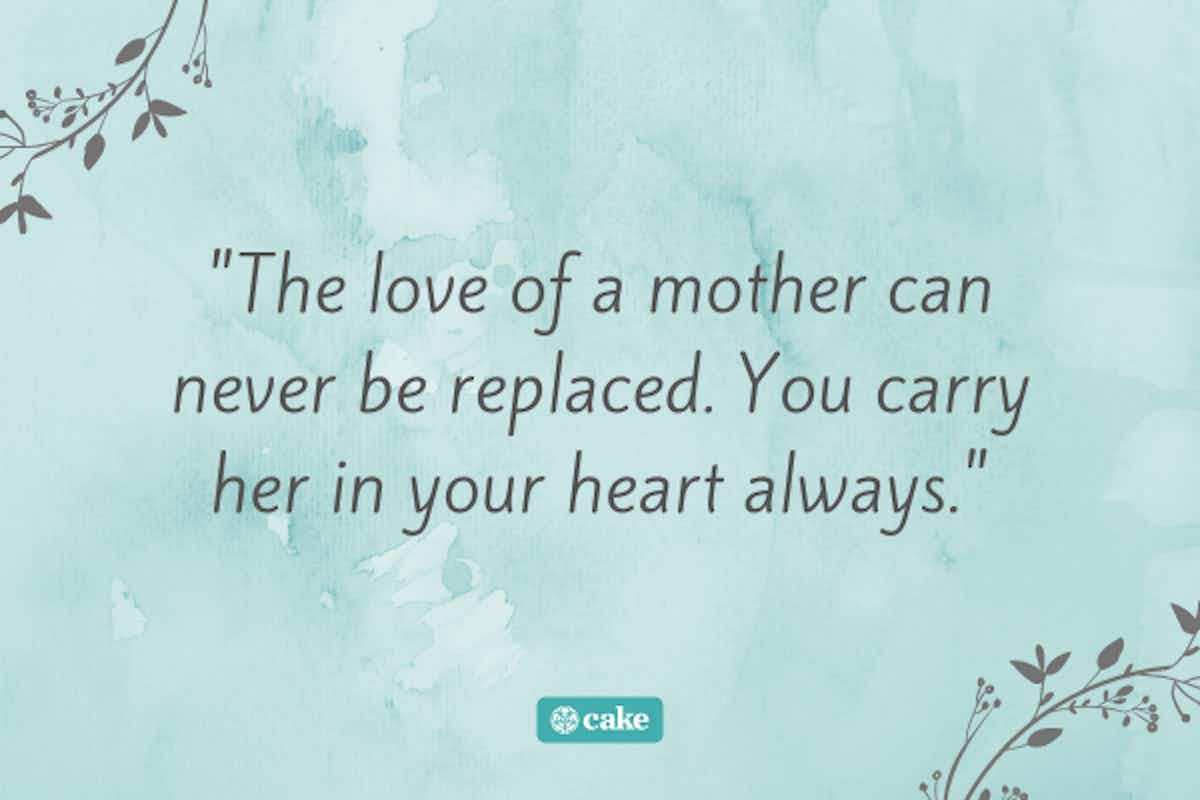
A mother is a trusted friend from the start , and this type of loss leaves a heartache that’s hard to capture . Mothers are a form of support, kindness, and love. Console those who lost a mother with one of these messages.
- Mothers have a special place in your heart. She will be with you always.
- Your mother’s kindness was contagious. I will never forget her.
- Our mothers are with us always. I am so sorry for your loss.
- The love of a mother can never be replaced. You carry her in your heart always.
- Your mother was a rare, beautiful soul. We were blessed to have known her.
- Sending all of my sympathies after the loss of your mother. Know that I am here for you.
- Your mother loved you more than anything. I’m so sorry for your loss.
- The world lost a beautiful soul. As you grieve, know you are in our thoughts.
A father is one of life’s first friends. Losing a father is one of the most difficult things anyone can go through. This bond is everlasting , even after death. The words below offer comfort in a time of darkness.
- The lessons taught by a father last a lifetime. May you always feel him near you.
- You were blessed with such a kind, special father. His memory lives forever through you.
- I’m thinking of you in your time of crisis. Your father was a wonderful man.
- There are no words to describe this loss. I am so sorry.
- May you see your father’s wisdom in everything you do.
- Your father was so proud of you. His love is a never-ending gift.
- Your father was so dearly loved by all. You are in our hearts.
- We are going to miss your father greatly. We’re always here if you need to talk.
A grandparent or great-grandparent is a reassuring presence in anyone’s life. Reaching out after this loss is the best way to be there for your loved one. Though they no longer have their grandma or grandpa in their life, they can still feel supported through these messages.
- I never met your grandma, but I want you to know that I’m always here for you.
- Your grandpa was a real force of nature. I know he will be missed.
- I’m sending all of my love to your family at this difficult time.
- I heard about your loss. That’s so tough. I am so sorry.
- If you ever want to talk about your grandma, I’d love to hear about her.
- Your great-grandpa was a lovely person. I will miss him.
- Your grandma’s memory is always with you. I will keep your family in my thoughts.
- Your grandparents would be so proud of you.
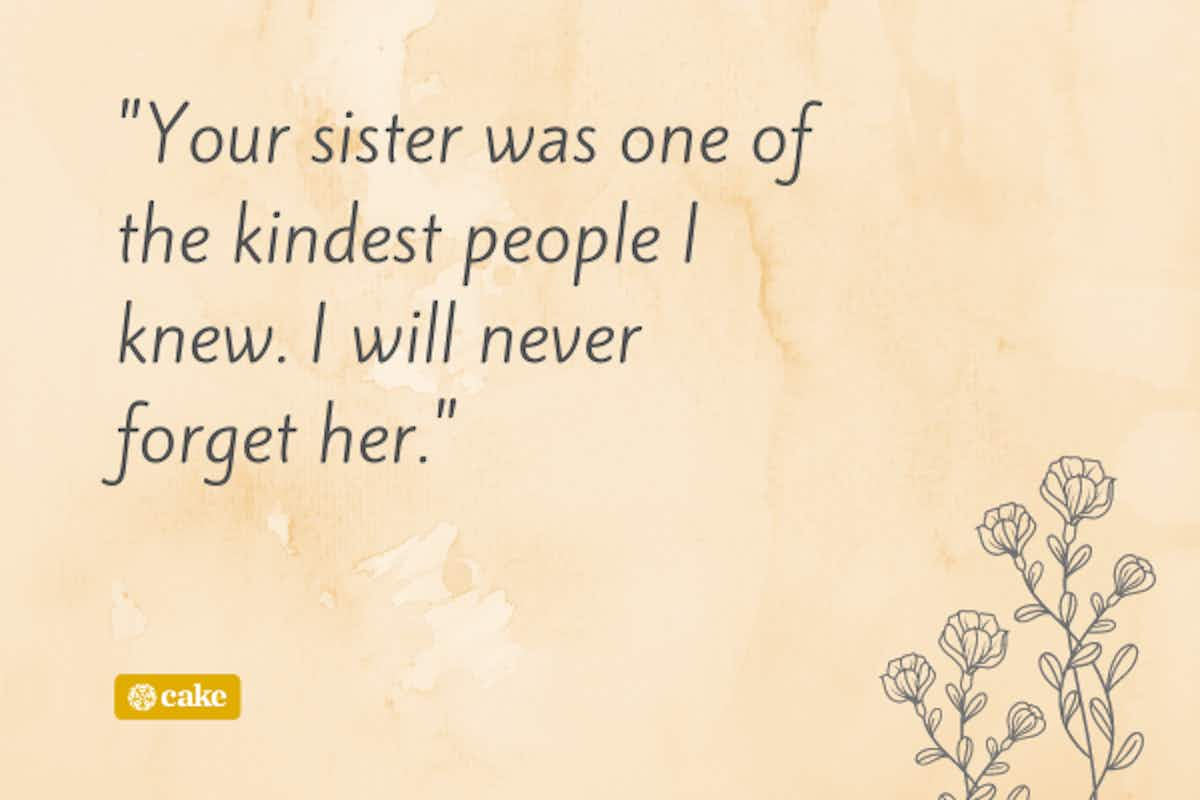
Our siblings are our closest companions and playmates from the earliest days. This type of loss is profoundly painful, and it takes ongoing compassion.
- Words can’t express how sorry I am that you’ve lost your brother.
- I'm thankful you have so many wonderful memories with your sister. Know that she is always with you.
- I hope you find comfort in knowing that your memories of her will never fade. I am thinking of you.
- Please know that I share your hurt, and I’ll be here for you during this time.
- You have my deepest condolences after the loss of your sister.
- Your sister was one of the kindest people I knew. I will never forget her.
- Your brother might no longer be here, but he will always be with you.
- If you need a hug, support, or just to talk about them, I’m here for you.
- Your sister was loved by so many. I am better for having known her.
Loss of a Partner or Spouse Condolence Messages
To lose a partner or spouse is to lose a part of yourself and your shared future . This is an extraordinarily difficult time. While you can’t possibly comprehend this devastating loss, you can be there for them.
- Your spouse left this world far too soon. I am keeping you in my thoughts and prayers.
- I am so sorry for your loss. Know that you will find your way through this pain. You are strong, and I'm here for you.
- My heart goes out to you and your family. If you need anything, please reach out.
- We share our sadness, joy, laughter, and memories. I send all of my heartfelt condolences.
- The sweet life you two shared will never leave you. This treasure lives within your heart forever.
- There is no greater sorrow, but I know you will find strength in the love you shared.
- Your partner was a special, kind person. They will never be forgotten.
- When you’re ready to talk, I’m always here.
- May the light of those around you guide you at this time. Remember that you are dear to me.
Losing a friend can be unexpected, and it’s hard to fill this void in your life. Coming to terms with never seeing them again feels isolating , especially if the loss was sudden. These words are a tender lifeline .
- I’m not sure what to say after such a sudden loss. Just know that I care about you.
- I was so saddened to hear about her passing. She was an amazing friend, and I know she adored you.
- Everyone could see you two were inseparable. Remember that these memories will never leave you.
- We would never have felt ready to say goodbye to someone so special. We wish you all of the strength and kindness.
- I just want you to know that I’m still thinking about you and your loss. I’m always here if you want to talk about it.
- I wish you all the healing and kindness in the world.
- A loss like this is felt by all. He was a special, unique person, and he will be missed.
Loss of a Child Condolence Messages
No parent wants to imagine the pain of losing a child. While no words can ease this pain, it’s important to show support in any way you can.
- I wish your daughter could have stayed with you, and with all of us, for much longer.
- I am so sorry you have to go through this. I hope there is some comfort in knowing he is so missed by all.
- Even though your son was only here a short while, he filled the world with joy.
- Your daughter was always a friend and a beacon of hope. She was so special, and she will be missed.
- The world was a better place because he was here.
- I am so sorry you had to say goodbye to your beloved child. Please know you are not alone.
- Sharing in your sorrow and your grief during this difficult time.
- Please remember that she will always be in your memories, your stories, and your laughter.
- I am so sorry for your loss. I will always remember your daughter’s smile.
In many cases, an aunt or uncle feels like a second parent to us — and this powerful bond doesn’t go away after death. Use these condolence messages to support someone after losing an aunt or uncle.
- I share your grief with you upon the loss of your aunt. Know my thoughts are with you, friend.
- Sending you warm sympathies after the loss of your [aunt/uncle]. Their absence will always be felt, but your memories will comfort you in times of grief.
- I know your [aunt/uncle] was always there for you. I’m so sorry for this loss.
- They would be so proud of you , and I know t hey will be with you always. Wishing you the best.
- You have all my sympathy for the loss of your [aunt/uncle]. They were so special, and I’ll never forget them.
- Losing an [aunt/uncle] is so hard. I can’t understand what you’re going through, but I wanted to let you know that I’m always here for you. Be well.
Like a sibling, a cousin is usually part of your earliest memories. Some cousins are closer than friends, creating a powerful relationship that spans a lifetime. Send someone warm wishes after losing a cousin with these powerful condolence messages.
- Friend, you’re in my thoughts as you navigate this terrible loss. I know you and your cousin were close. My warmest condolences are with you.
- Sending you thoughts and prayers as you get through this awful loss. Stay strong, love.
- The loss of a beloved cousin is so difficult. Please remember that you’re not alone.
- Your cousin’s legacy will never be forgotten. They will live on through you every day.
- May your happy memories together with your cousin bring you comfort. I’m so sorry for what you’re going through.
- There will never be another like your cousin. They were so special. If there’s anything I can do for you, please let me know.
- Sending you my love after the loss of your cousin. You two were always so close, and I know they’ll always be with you.
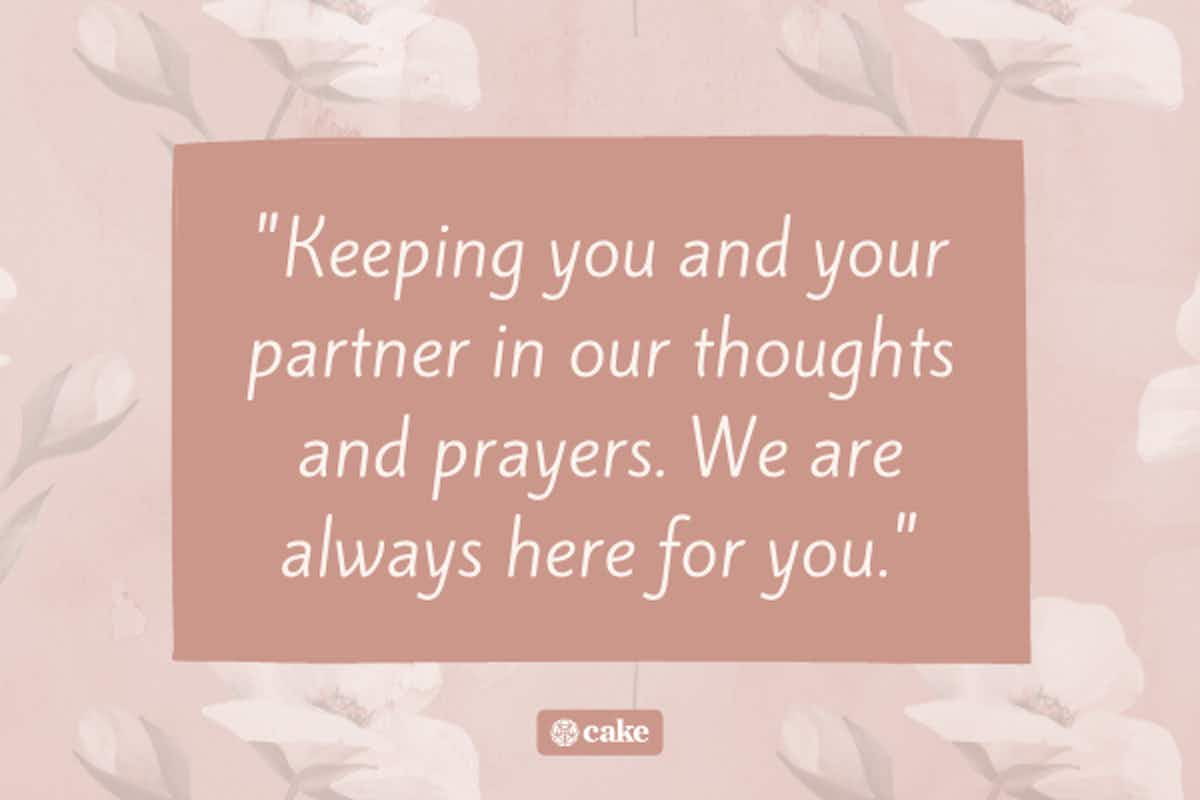
Pregnancy loss is difficult to discuss , but it’s important parents get enough support . Because these losses are often only shared with small groups of people, take this opportunity to really be there with your words.
- The love for your child-to-be was very real, and so is this loss. Please honor whatever you are feeling. We grieve with you.
- Keeping you and your partner in our thoughts and prayers. We are always here for you.
- I am so sorry for this loss. I can’t begin to fathom what you’re feeling.
- Be gentle and kind to yourself during this time. We are all supporting you.
- I just want to remind you that this was not your fault. I’m sorry this happened, and I’m here for you.
- We all shared in your hopes and dreams for this baby. I am so sorry for your loss.
Given the stigma around suicide , it’s often challenging to choose the right words after this type of loss. Offering comfort, kindness, and support is always the right choice.
- I cannot imagine how hard it is to lose your friend. I know you loved them so much.
- I can’t possibly understand what you’re going through, but I’m always here if you need to talk.
- Take as long as you need to grieve. I am here for you.
- Wishing you hope and peace during this challenging time.
- My heart goes out to you and your family.
- Words seem inadequate to express how I feel, but please know you are in my thoughts.
- This is an unbelievable tragedy. I am so sorry for the pain you must be feeling.
Another type of loss that’s often surrounded by taboo is the loss of a loved one to addiction . Offering support after this type of death can be complicated — but you shouldn’t stay quiet. Here are some condolence messages to be there for someone in need.
- I will always remember them and what they meant to you.
- My heart breaks for you and your family. Know that I am here.
- They were such a kind, unique person. I will always remember them.
- Please know that you are never alone. We stand with you during this sadness.
- I am at a loss for words after hearing about your loved one. Please let me know if you need anything.
- I hope you find strength in knowing how much they loved you.
- There are no words to describe this loss. I am always here for you.
A beloved pet is a member of the family. If your loved one lost a cat, dog, or another pet, honor this loss with comforting words . By acknowledging and validating their pain, you ease the burden of their grief.
- Losing such an important member of the family is never easy.
- I am so sorry for the loss of your pet. He was an amazing dog.
- I know you miss your dear cat greatly. She was clearly loved and cared for, and it’s a comfort knowing she lived a beautiful life.
- You and your dog were lucky to have found each other. He will be so missed.
- We will always remember your lovable girl. She was so much more than a pet.
- You’re in our hearts as we all mourn the loss of your cat. He was truly one of a kind.
- I am so saddened to hear about the loss of your dog. I know how much she meant to you.
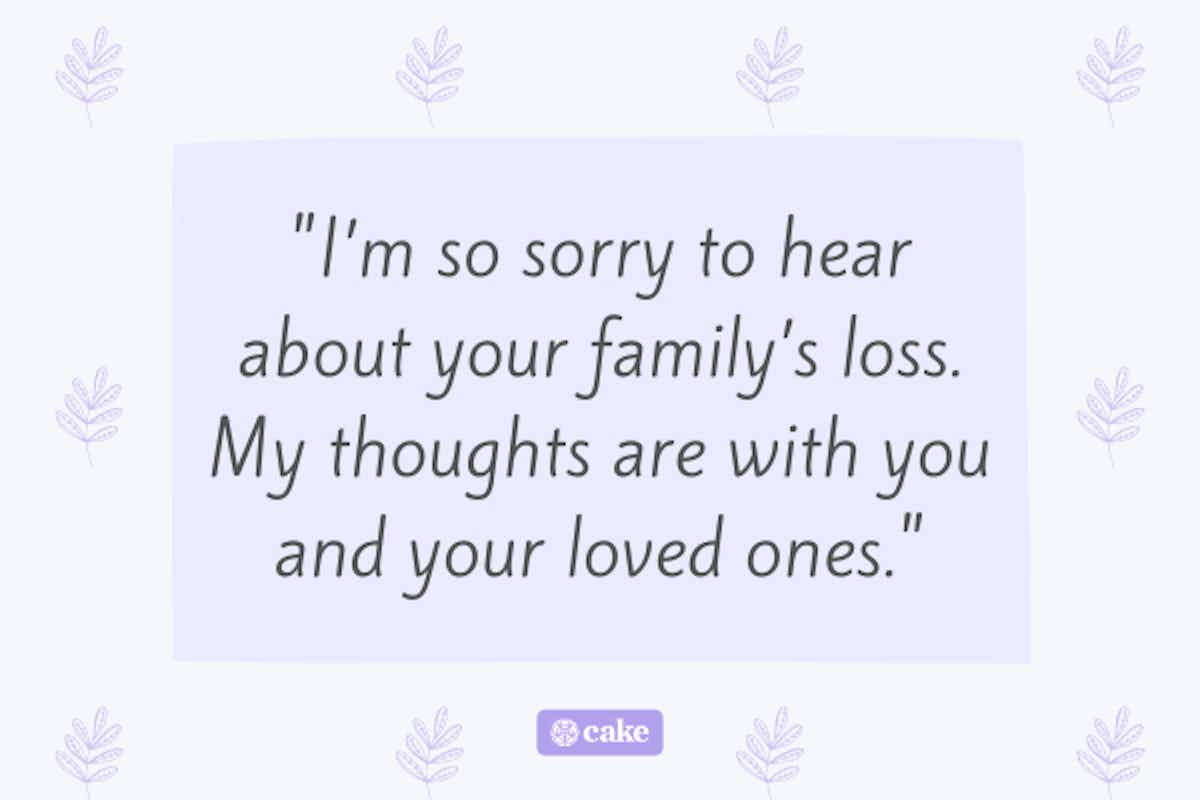
It’s common to send condolence messages to the whole family, but this can make it confusing to know what to say. These messages are ideal to send to an entire family, offering much-needed comfort.
- I’m so sorry to hear about your family’s loss. My thoughts are with you and your loved ones.
- May my condolences bring you and your family comfort during this dark time.
- I am so saddened by this loss. You have my deepest condolences.
- I will never forget them. Sending kind wishes and love to your family.
- I am truly sorry for your family’s loss.
- In this sad time, I would like to extend my heartfelt condolences to your family.
Loss in the workplace can be tricky to navigate, but you still want to show support. These messages are more formal, making them appropriate for workplace situations.
- I am so sorry about your loss.
- May your loved one rest in peace.
- It was a joy to work in her presence. I’ll never forget the smile she brought to the office.
- He will be in our hearts and memories.
- Thinking of you in the midst of pain.
- The loss of our coworker is felt by many. We will continue to honor and remember them.
- Thinking of you and your loss during this time.
On the anniversary of a loved one’s death, it’s helpful to hear words of encouragement. After all of this time, the pain of grief can resurface . Be there for your loved one during a death anniversary with these caring messages .
- I know your loved one passed a year ago, and I just wanted to check in to let you know that I’m thinking of you.
- As each day passes, we miss them more and more. Thinking of you.
- Even after a year, my heart still aches for you. I’m so sorry for your loss.
- You’re in my thoughts and prayers today.
- Please accept my condolences on such a difficult anniversary.
- Sending you my warmest thoughts today.
- Wishing you all the strength on this challenging day.
- Where there is deep grief, there is deep love. All the best.
A common form of sympathy is to say ‘my deepest condolences.’ These messages below build on that sentiment, offering authentic compassion.
- Holding you close in my thoughts.
- Sending my deepest condolences to you and your family.
- With deepest sympathy as you remember your loved one.
- She will be deeply missed. Sending you all of my warmth.
- Wishing your family peace during this difficult time.
- You have all of my sympathies.
For those who practice a specific religion, honoring the presence of a higher power or an afterlife is a source of peace. These religious messages are a reminder that you’re never alone.
- Our thoughts and prayers are with you.
- Your loved one has found eternal rest with the Lord.
- I am wishing you love, prayers, and God’s light during this time.
- I will pray for you and your family. God bless.
- He gives you strength in times of grief.
- Heaven received a new angel. May you find peace and comfort during this time.
- We will remember him in our prayers and our memories.
If you’re texting a condolence message , you can still offer your genuine words. These short and sweet messages fit any text, email, or DM.
- I’m so sorry to hear of your loss.
- Thinking of you today. Please let me know if you need anything.
- I’m sorry I can’t be there in person, but I wanted to let you know that I’m thinking of you.
- Please accept my warm and heartfelt sympathy, friend.
- No words describe how sorry I am. Wishing you all the best.
- My heart hurts for you. You’re in my thoughts.
- I’m so sorry you’re going through this.
Whether someone lost a loved one to a serious illness or received a challenging diagnosis, be there with your words. These well-wishes are a source of comfort.
- You mean so much to me. I’m always thinking of you.
- If you need me for anything, I’m there for you.
- Sending hugs, love, and kindness.
- I’m here for you no matter what you need.
- I’m so sorry about this news. Sending all of my warmth your way.
- We’ll take this on together.
- I don’t know what to say, but I’m thinking of you.
Here are some appropriately concise condolence messages to send with flowers .
- Gone but never forgotten.
- With love and happy memories.
- May he rest in peace.
- Always in my heart.
- In loving memory.
- They will be sorely missed.
- Forever in our memories and thoughts.
All losses are difficult, and there’s no way to compare grief. However, an unexpected loss can completely upend your world, spinning everything upside down. If your loved one is experiencing a sudden loss, show them compassion with these condolence messages .
- Dear friend, I am so sorry to hear of your sudden loss. Accept my heartfelt condolences during this difficult time.
- I was so shocked to hear this news. My heart goes out to you and your family.
- I know this is a sudden shock. I can’t imagine what you’re going through after losing your loved one. Know that we all support you and your family during this time.
- It’s hard to make sense of what has happened. Not having your loved one around anymore is heartbreaking. I just wanted to share that I’m here to support you in any way you need.
- Your loved one will be so missed. You’re always in my thoughts and prayers.
- I will miss [Name] like crazy. While the shock of hearing they passed is heartbreaking, I find peace knowing they were so loved. They will never be forgotten.
Sometimes it’s helpful to use a powerful quote that perfectly captures your feelings. One of these famous condolence quotes might be right for you.
- “It is not length of life, but depth of life.” — Ralph Waldo Emerson
- “Wherever you are, you will always be in my heart.” — Mahatma Gandhi
- “Tears are the silent language of grief.” — Voltaire
- “The best and most beautiful things in the world cannot be seen or even touched. They must be felt with the heart.” — Helen Keller
- “The memory of the righteous is a blessing.” — Proverbs 10:7
- “Tears shed for another person are not a sign of weakness. They are a sign of a pure heart.” — Jose Harris
- “It's so much darker when a light goes out than it would have been if it had never shone.” — John Steinbeck
Confronting your emotions after a loss is hard , but supporting others can be its own challenge. These rest-in-peace condolence messages can provide comfort.
- May your loved one rest in peace. Sending you warm condolences and compassion upon the loss of [Name].
- I’m so sorry to hear of your loss. My condolences to you and your family. May your loved one rest in eternal peace.
- Sending you my deepest sympathy. Rest in peace, [Name].
- Though it’s hard to lose your loved one, there is also relief knowing they now rest in peace. Be well during this time.
- Today, we remember the kind, gentle, loving soul that’s no longer with us. May they rest in peace forever.
- We will never forget [Name]. Their memories live on forever in our hearts. Rest in peace, friend.
- I’m truly sorry to hear of your loss. I’ll never forget [Name’s] kindness. May they rest in peace.
- I want to offer you and your family my deepest condolences. May your loved one find peace, and may your happy memories together bring you comfort.
If you’re supporting someone through a death announcement or sharing your feelings on social media, these condolence messages are a powerful way to connect with others going through the same thing .
- May your loved one rest in peace. They’re gone, but they’ll never be forgotten.
- There are special people in our lives who never leave us. Though they’re no longer here in person, they’re always with us in spirit.
- Though I’m sad to hear of your loss, I’m glad you’re reaching out for support. Know that we’re always here for you. Wishing you the absolute best.
- With a broken heart and sadness, I join you in your goodbye to [Name]. They were one-of-a-kind, and I'll never forget their smiles.
- Sending you virtual hugs and sympathy. Though I can’t be there with you right now, I am always there to support you no matter what you need.
- I’m deeply sorry for your loss. I’m thinking of you today and always.
- Your loved one was a wonderful person. I remember when they [short story]. This memory will give me comfort as I grieve this loss.
- The world is a darker place without them in it, but I’m a better person for having known them. Be well and take care of yourself as you grieve your loss.
A condolence gift is a great way to show support through a physical gesture, but you need the right message behind it. Here are some ideas.
- Dear friend, I’m so sorry to hear of your loss. I hope this small gesture of kindness brings you peace in a time of crisis.
- I’m so sorry for the loss of your loved one. Please accept this small token of support. Though it’s small, I hope it brightens your day.
- I know how hard it can be to lose someone so special. Your loved one will be missed eternally. May this gift ease your burden. Be well, friend.
- Our thoughts are with you and your family during this time. Please accept this small gift as a sign of my compassion.
- You and your family are always in our prayers. I’ve sent along a family memento that reminds me of your loved one. I hope it brings you peace and comfort in your time of loss.
- Dearest friend, I’m thinking of you in your time of grief. [Name] was an amazing person. I hope this gift helps keep their memory alive.
- While no words can describe how sorry I am for your loss, this gift is a way to show my support. I’ll always be here no matter what you need.
- Though there is nothing that can take away your pain, may this practical gift make life a bit easier as you navigate these next steps. I’m thinking of you today and always.
If someone sends you condolence messages or gifts, make sure they feel heard. Repay their kindness with one of these thank-you messages .
- Dearest friend, thank you for your kind words in my time of need.
- I’m so thankful to have people like you in my life. You made this difficult time so much easier. I can’t thank you enough.
- Thank you so much for your thoughtful gift and message. Your words raised me from a dark place, and I’m eternally grateful to have you close.
- The flowers you sent in honor of [Name] were so beautiful. Thank you for thinking of our family. Your support meant the world to us.
- The gift you sent to the funeral home was so touching, thank you. We can’t thank you enough for being there.
- Your donation in honor of my loved one made such a difference. It’s helpful to know that we have so much support behind us, especially when it comes to preserving [Name’s] legacy.
- Dear friend, you made one of the worst times in my life so much easier. I don’t know what I would have done without you. Thank you.
- The kindness you showed meant so much to us. You knew exactly what we needed in our time of grief.
- Your appreciation won’t be forgotten. I’m so thankful to have you in my life.
Writing condolences can be intimidating, especially if you haven’t done it before . Here are some pointers to help you craft the right message.
When should you send a condolence message?
You should send your condolence message as soon as possible after someone experiences a loss. This should typically be sent before or shortly after the funeral. That being said, there is no deadline.
No matter how much time has passed, you can always send a condolence message. In fact, you can send this message on the anniversary of the death or years from now to let them know you’re thinking of them.
Is there anything you should avoid saying when sending a condolence message?
When you send a condolence message, you should be mindful of your language. Avoid using phrases like “they’re in a better place” or “you’ll get over this.”
In addition, don’t compare their experience to your own grief. Everyone handles loss differently, so make sure they know you’re focusing on them .
What should you include in a condolence letter?
Your condolence letter doesn’t need to be complicated. Including a short greeting, a kind message, and well-wishes is plenty . You might also want to share a special memory of the deceased, a photo, flowers, or other sympathy gift idea . However, this is optional .
What should you include in professional condolence messages to clients, bosses, or coworkers?
In a professional condolence message, keep things short and simple. You can talk about how much their loved one meant to them, but avoid any empty sentiments. Sending a small sympathy gift , like flowers, is a thoughtful idea.
When should you send a gift with a condolence message?
You’re never required to send a gift with a condolence message. That said, it’s a good idea if you’re particularly close to the deceased or their family or you’re unable to attend the funeral. Flowers are the most common sympathy gift.
There are many ways to share words of support and show we care.
- Reach out via text or instant message: Send a brief message to let them know you're thinking of them and offer your support. Inquire about how they're doing, extend help if they need it, and remind them you're here to listen.
- Make a phone call: A personal phone call is an excellent way to offer support and demonstrate that you care. Take the time to inquire about their well-being, offer words of encouragement, and listen to their thoughts.
- Use social media: Social media can be an effective way to publicly show support to someone. You can post a message of encouragement on their wall, tag them in a supportive post, or simply comment on their recent activity.
- Offer support on a memorial page: If someone has recently lost a loved one, you can offer your support and condolences on a memorial page. Share a memory or a thoughtful message that shows you care. If it's a Cake memorial page , they may have also set up a fundraiser where you can help cover the costs of funeral expenses or support a cause in the person's honor.
- Show up in person: If possible, offer support in person. Sometimes a simple gesture like a hug or being there to listen can make a significant difference.
- Send a card or care package: Include a handwritten note, small gifts or treats, or anything else that might brighten their day and remind them they're not alone.
Ultimately, sympathy comes in many shapes and sizes. These words remind us that we’re not alone, that others stand with us, and that our loved ones will be remembered. The sympathy messages above can support someone who experienced a recent loss, honoring their experience .
Whether you’re sending flowers, a card, or a text message, don’t stress about finding the perfect words . It’s always better to say something than to stay silent.
Categories:
You may also like.

175 Unique Get-Well Wishes to Write in a Card, Text, or Email

8+ Funeral Luncheon Menu + Decoration Ideas

40 Thought-Provoking Questions to Get to Know Your Family

How to Sign a Sympathy Card (With 25 Example Signatures)
- Daily Crossword
- Word Puzzle
- Word Finder
- Word of the Day
- Synonym of the Day
- Word of the Year
- Language stories
- All featured
- Gender and sexuality
- All pop culture
- Grammar Coach ™
- Writing hub
- Grammar essentials
- Commonly confused
- All writing tips
- Pop culture
- Writing tips
Advertisement
[ k uh n- doh -l uh ns ]
- Often condolences. expression of sympathy with a person who is suffering sorrow, misfortune, or grief.
/ kənˈdəʊləns; kənˈdəʊlmənt /
- often plural an expression of sympathy with someone in grief, etc
Discover More
Word history and origins.
Origin of condolence 1
Example Sentences
Your entire world has crumpled, and without the benefit of traveling to see people and receive their personal condolences, you are quite naturally continuing to grieve.
Each stopped to offer condolences to Miller’s wife, Patti, and his one of his daughters, Melanie.
I had assumed that he would at least have sent some form of condolences when she died.
We also reached out to the family on multiple occasions afterward to again offer condolences and seek an opportunity to discuss what happened.
The pre-2020 formula for dealing with death online meant memorializing the Facebook account of the deceased, maybe opening an online condolence book with a funeral home, perhaps a GoFundMe page to raise money for expenses.
To Hitchcock, this is not a sweet wire from an old colleague but a condolence letter on the occasion of his own death.
The letters of condolence when she died in March at the age of 87 included one from an African American who had become president.
She rarely dropped names of her famous friends, except Prince Charles', who issued a public note of condolence after her death.
Before Mr. Chen left the museum, he signed a condolence book by the corner library.
This year, the condolence book from the June 4th Museum will be burned in a ceremony of remembrance.
In paying your visits of condolence, show, by your own quiet gravity, that you sympathize in the recent affliction of your friend.
Pay visits, both of condolence and congratulation, within a week after the event which calls for them occurs.
Letters of Condolence are exceedingly trying, both to read and to write.
It lowered its voice in passing and made its calls of condolence in dark clothes and a general air of gloom.
A few words of condolence and sympathy were offered, and they separated to prepare for dinner.
Related Words
- consolation
- Cambridge Dictionary +Plus
Meaning of condolence in English
Your browser doesn't support HTML5 audio
- bad/hard/tough luck! idiom
- better luck next time idiom
- bleeding heart
- heart-wrenching
- heart-wrenchingly
- heartrending
- heartrendingly
- pitifulness
- sensitivity
- sympathetic
- your heart goes out to someone idiom
condolence | American Dictionary
Examples of condolence, translations of condolence.
Get a quick, free translation!

Word of the Day
under lock and key
locked away safely

Dead ringers and peas in pods (Talking about similarities, Part 2)

Learn more with +Plus
- Recent and Recommended {{#preferredDictionaries}} {{name}} {{/preferredDictionaries}}
- Definitions Clear explanations of natural written and spoken English English Learner’s Dictionary Essential British English Essential American English
- Grammar and thesaurus Usage explanations of natural written and spoken English Grammar Thesaurus
- Pronunciation British and American pronunciations with audio English Pronunciation
- English–Chinese (Simplified) Chinese (Simplified)–English
- English–Chinese (Traditional) Chinese (Traditional)–English
- English–Dutch Dutch–English
- English–French French–English
- English–German German–English
- English–Indonesian Indonesian–English
- English–Italian Italian–English
- English–Japanese Japanese–English
- English–Norwegian Norwegian–English
- English–Polish Polish–English
- English–Portuguese Portuguese–English
- English–Spanish Spanish–English
- English–Swedish Swedish–English
- Dictionary +Plus Word Lists
- English Noun
- American Noun
- Translations
- All translations
Add condolence to one of your lists below, or create a new one.
{{message}}
Something went wrong.
There was a problem sending your report.

IMAGES
COMMENTS
Visiting in Person. When someone experiences the loss of a loved one, visiting the bereaved in person is a thoughtful way to convey the deepest sympathy and offer support. Finding the proper way to express condolences can be difficult. There are several ways to show honor and to respect the memory of the departed, including visiting in person.
The best thing to say at a condolence visit is what is in your heart…and then switch and put on your listening ears. Express your sadness and share memories, but also be prepared to support your friend or relative however they need. For most people, this means offering your understanding without intruding in the conversation.
The phrase "my condolences" is an expression of sympathy and sorrow, typically offered to someone who has experienced a loss or is going through a difficult time, such as the death of a loved one. When you say "my condolences," you are expressing your heartfelt sympathy and offering comfort to the person who is grieving.
Condolence messages for a friend. [Name], I am so sorry that your [parent, sister, cousin, nephew, etc.] died. I am thinking of you and your family. I'm so sorry to hear of your loss. I am always here for you, and I am sending you love and strength during this distressing time.
You should try to speak from a place of love and compassion, and honestly acknowledge the situation. Three good rules to follow when figuring out what not to say are: Don't deny that the person who died is dead. Don't deny that the bereaved is in emotional pain. Don't deny that this death may change everyone's lives forever.
Thinking of you. Sharing in your sorrow and here for you in the days ahead. Thinking of you and sending my love during this difficult time. My heart goes out to you and your family. My deepest ...
How to Write Condolences. Dear [Recipient's Name]: [I/We] are so sorry to hear about the passing of [Deceased's Name]. [He/She] was a good [Type of Relationship] to us, and will forever be missed. Our favourite memory of [Him/Her] is the time when [Share Story]. Please accept our deepest condolences.
The meaning of CONDOLENCE is sympathy with another in sorrow. How to use condolence in a sentence. Condolence and Condolences Synonym Discussion of Condolence. ... After the 1985 Bradford stadium fire, during the Prime Minister's visit of condolence to the city, . . . — William Leith, The Independent (London), 25 Nov. 1990.
When writing a condolence note, pick just a few elements from the steps to writing a condolence letter. For example: Acknowledge the loss and refer to the deceased by name. Express your sympathy. Note one or more of the deceased's special qualities. End with a thoughtful hope, wish, or a genuine expression of sympathy.
Receiving visitors during times of mourning: Make sure not to sit on chairs low to the ground. Undoubtedly you will be hugging people, and if you are sitting low down it will involve reaching up repeatedly. Consider wearing a dark colored shirt; if you are hugging many people, you may end up with some make-up on your shoulders, and it won't ...
If you ever want to talk, I'm here.". "Deepest condolences to you and your family for your loss.". "Words cannot express how saddened we are to learn of your loss. Please take your time ...
God bless you and your family. My thoughts and prayers are with you in your time of grief. I'm so sorry for your loss. I'm going to miss her/him too. I wish you peace and comfort as you grieve ...
Religious condolence messages. 121. I was deeply saddened to hear of your loss—you and yours are in my prayers, day and night. 122. May God comfort and keep you safe in his hands during this ...
CONDOLENCE meaning: 1. sympathy and sadness for the family or close friends of a person who has recently died, or an…. Learn more.
I share your grief with you upon the loss of your aunt. Know my thoughts are with you, friend. Sending you warm sympathies after the loss of your [aunt/uncle]. Their absence will always be felt, but your memories will comfort you in times of grief.; I know your [aunt/uncle] was always there for you. I'm so sorry for this loss.
Condolence definition: expression of sympathy with a person who is suffering sorrow, misfortune, or grief.. See examples of CONDOLENCE used in a sentence.
CONDOLENCE definition: 1. sympathy and sadness for the family or close friends of a person who has recently died, or an…. Learn more.
Unlocking the Meaning of 'Condolence Visit' in English • Discover the true essence and significance of 'Condolence Visit' in English culture and language. Jo...
Samanantar. During a visit to a local mausoleum, he prayed for the victims of the bus blaze and expressed condolences to the families: gv2019. In a TV statement the following day, Captain Camara expressed his condolences with the families of those killed and visited some of the injured. Europarl8.
Mistry's style in "Condolence Visit" is concise and subtle, laced with irony and flashes of wit and humor. He uses a number of Parsi words and allusions to add local color to the story and ...
Thematically, "Condolence Visit" questions the relevance of traditional customs in modern society. By juxtaposing the intense human feelings of a Parsi widow against the prescribed conventions ...
Summary. Told from a limited omniscient point of view, "Condolence Visit" focuses mostly on the inward consciousness of Daulat Mirza, a Parsi widow, and reflects her attitude of quiet defiance ...